Shows
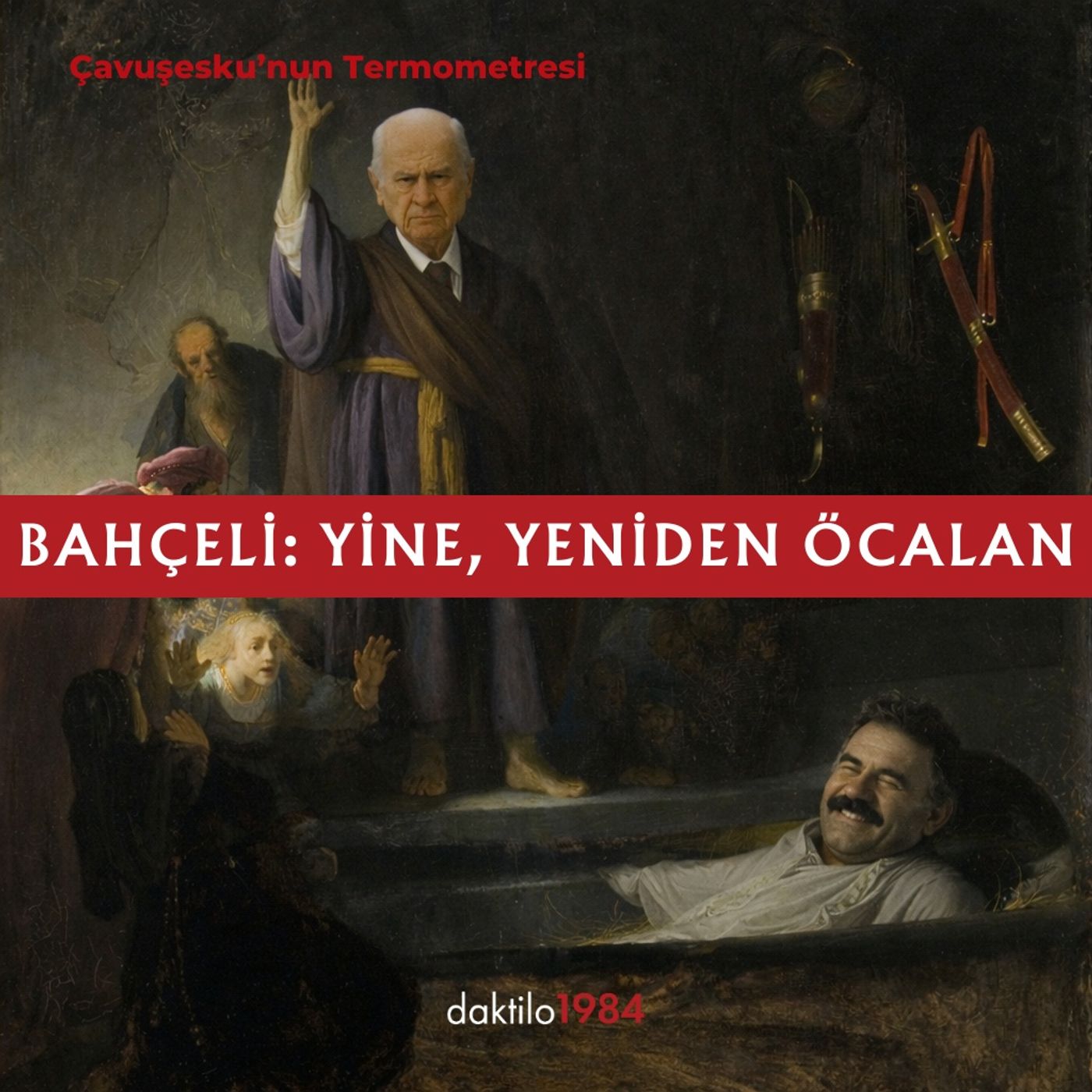
Daktilo1984Bahçeli: Yine, Yeniden Öcalan | Çavuşesku'nun Termometresi #292Çavuşesku'nun Termometresi'nde Ekin Keleş moderatörlüğünde Prof. Dr. Burak Bilgehan Özpek ve İlkan Dalkuç; Devlet Bahçeli'nin yine, yeniden Öcalan açıklamasını, Rojava'dan sonra sürecin devam etme ihtimalini, açıklanan Epstein dosyalarının yarattığı çalkantıyı konuşuyor.27. dakikada bahsedilen akademi üzerine yayın: https://youtube.com/live/wHHXgOncuggBahçeli'nin başlığı belirleyen açıklamasının tam metni: https://www.mhp.org.tr/htmldocs/mhp/5520/mhp/Milliyetci_Hareket_Partisi_Genel_Baskani_Sayin_Devlet_BAHCELI__nin_TBMM_Grup_Toplantisinda_yapmis_olduklari_konusma_3_Subat.html00:00 Giriş00:35 Erdoğan'ın tekelleri, medyanın finansmanı ve itaatine...
2026-02-031h 06
Çavuşesku'nun TermometresiBahçeli: Yine, Yeniden Öcalan | Çavuşesku'nun Termometresi #292Çavuşesku'nun Termometresi'nde Ekin Keleş moderatörlüğünde Prof. Dr. Burak Bilgehan Özpek ve İlkan Dalkuç; Devlet Bahçeli'nin yine, yeniden Öcalan açıklamasını, Rojava'dan sonra sürecin devam etme ihtimalini, açıklanan Epstein dosyalarının yarattığı çalkantıyı konuşuyor.27. dakikada bahsedilen akademi üzerine yayın: https://youtube.com/live/wHHXgOncuggBahçeli'nin başlığı belirleyen açıklamasının tam metni: https://www.mhp.org.tr/htmldocs/mhp/5520/mhp/Milliyetci_Hareket_Partisi_Genel_Baskani_Sayin_Devlet_BAHCELI__nin_TBMM_Grup_Toplantisinda_yapmis_olduklari_konusma_3_Subat.html00:00 Giriş00:35 Erdoğan'ın tekelleri, medyanın finansmanı ve itaatine...
2026-02-031h 06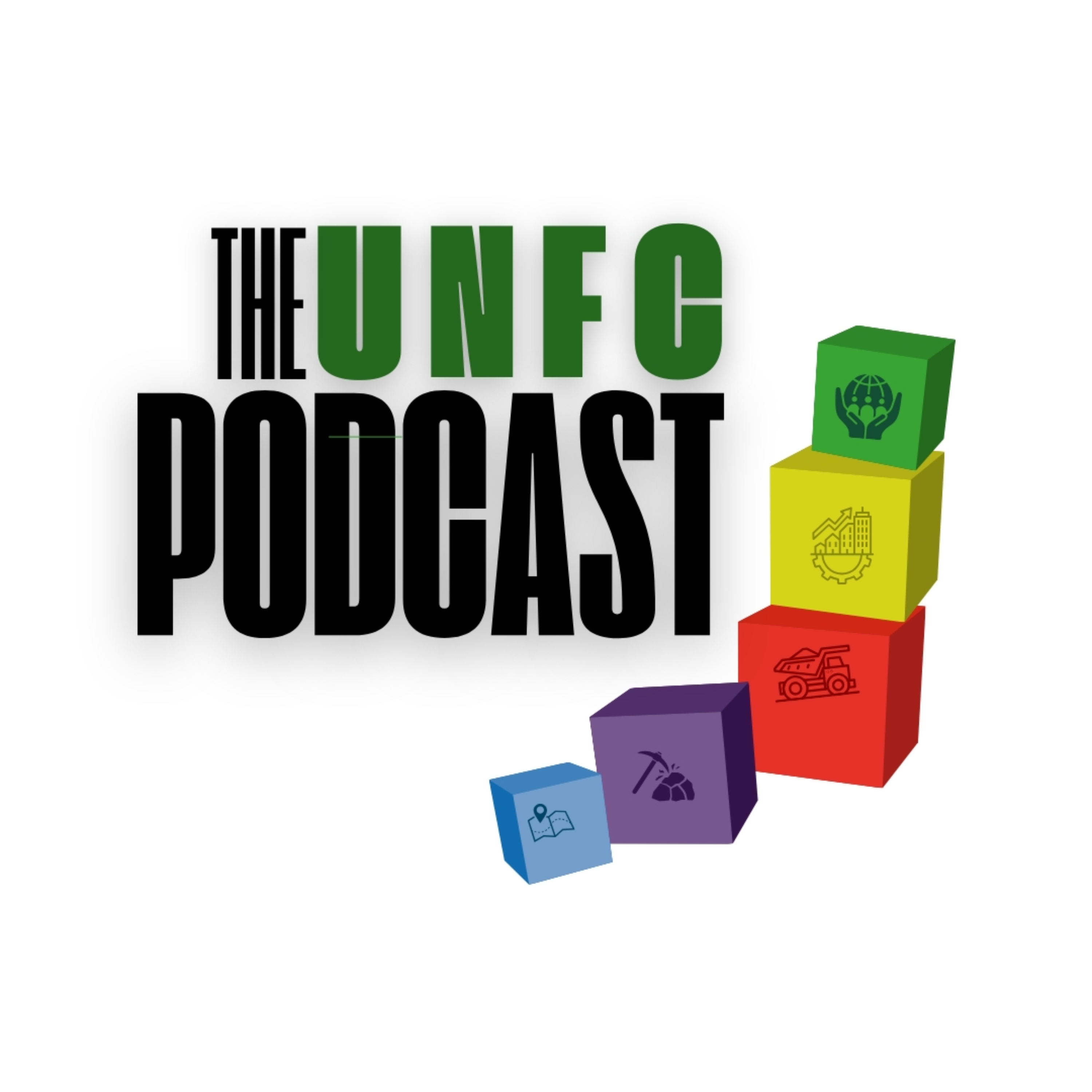
The UNFC PodcastEpisode 10: Overview of the series and thoughts for the future of UNFCIn this series wrap up, we’ll be looking back across the UNFC Podcast and discussing the themes and topics that have run throughout the whole series. 🎙️Join hosts, Alexander Fuentes, Chris Stockey, and Matthew Grimshaw as they discuss if the questions they had about the United Nations Framework Classification for Resources (UNFC) have been answered, and what they think lies ahead for the UNECE’s resource classification system.A big thank you to Critical Productions for producing this podcast series, and another massive thank you to all the guests who appeared on The UNFC Podcast f...
2025-12-1918 min
The UNFC PodcastEpisode 9: Discussion with the UNECE - UNFC'S Past, Present and Future🇺🇳 Join us in conversation with a video panel of members of the United Nations Economic Commission for Europe (UNECE), who are 𝗱𝗶𝗿𝗲𝗰𝘁𝗹𝘆 𝗶𝗻𝘃𝗼𝗹𝘃𝗲𝗱 𝗶𝗻 𝘁𝗵𝗲 𝗱𝗲𝘃𝗲𝗹𝗼𝗽𝗺𝗲𝗻𝘁 𝗼𝗳 𝘁𝗵𝗲 𝗨𝗻𝗶𝘁𝗲𝗱 𝗡𝗮𝘁𝗶𝗼𝗻𝘀 𝗙𝗿𝗮𝗺𝗲𝘄𝗼𝗿𝗸 𝗖𝗹𝗮𝘀𝘀𝗶𝗳𝗶𝗰𝗮𝘁𝗶𝗼𝗻 𝗳𝗼𝗿 𝗥𝗲𝘀𝗼𝘂𝗿𝗰𝗲𝘀 (𝗨𝗡𝗙𝗖). We’ll be discussing with the UNECE just 𝗵𝗼𝘄 𝗨𝗡𝗙𝗖 𝗵𝗮𝘀 𝗱𝗲𝘃𝗲𝗹𝗼𝗽𝗲𝗱 since the 1990s, what 𝗰𝗵𝗮𝗹𝗹𝗲𝗻𝗴𝗲𝘀 𝘁𝗼 𝗶𝘁 𝗮𝗰𝗵𝗶𝗲𝘃𝗶𝗻𝗴 𝗶𝘁𝘀 𝗳𝘂𝗹𝗹 𝗽𝗼𝘁𝗲𝗻𝘁𝗶𝗮𝗹, and what opportunities exist for UNFC to become 𝗮 𝗹𝗲𝗮𝗱𝗶𝗻𝗴 𝗳𝗿𝗮𝗺𝗲𝘄𝗼𝗿𝗸 𝘁𝗼 𝗵𝗲𝗹𝗽 𝗯𝘂𝗶𝗹𝗱 𝗮 𝗺𝗼𝗿𝗲 𝘀𝘂𝘀𝘁𝗮𝗶𝗻𝗮𝗯𝗹𝗲 𝘄𝗼𝗿𝗹𝗱. 𝗢𝘂𝗿 𝗴𝘂𝗲𝘀𝘁𝘀 𝗳𝗼𝗿 𝘁𝗵𝗲 𝗲𝗽𝗶𝘀𝗼𝗱𝗲 𝗮𝗿𝗲: Erika Ingvald, Economic Affairs Officer, Sustainable Energy Division Hari Tulsidas, Economic Affairs Officer, Sustainable Energy Division Ghadi Sabra, UNECE Consultant Maria Victoria Oliver, UNECE Consultant 🎙️Hosted by Chris Stockey, Matthew Grimshaw, and Alexander Fuentes. Find out more about The UNFC Podcast here: https://satarla.com/unfc-podcast/ Podcast produced by Critical Productions. #UNFCPodcast #UNFC #UNECE #SustainableEnergyDivision #UnitedNations #UN #CRMA #CriticalRawMaterials #RawMaterials #Mining #Sustainability
2025-12-171h 00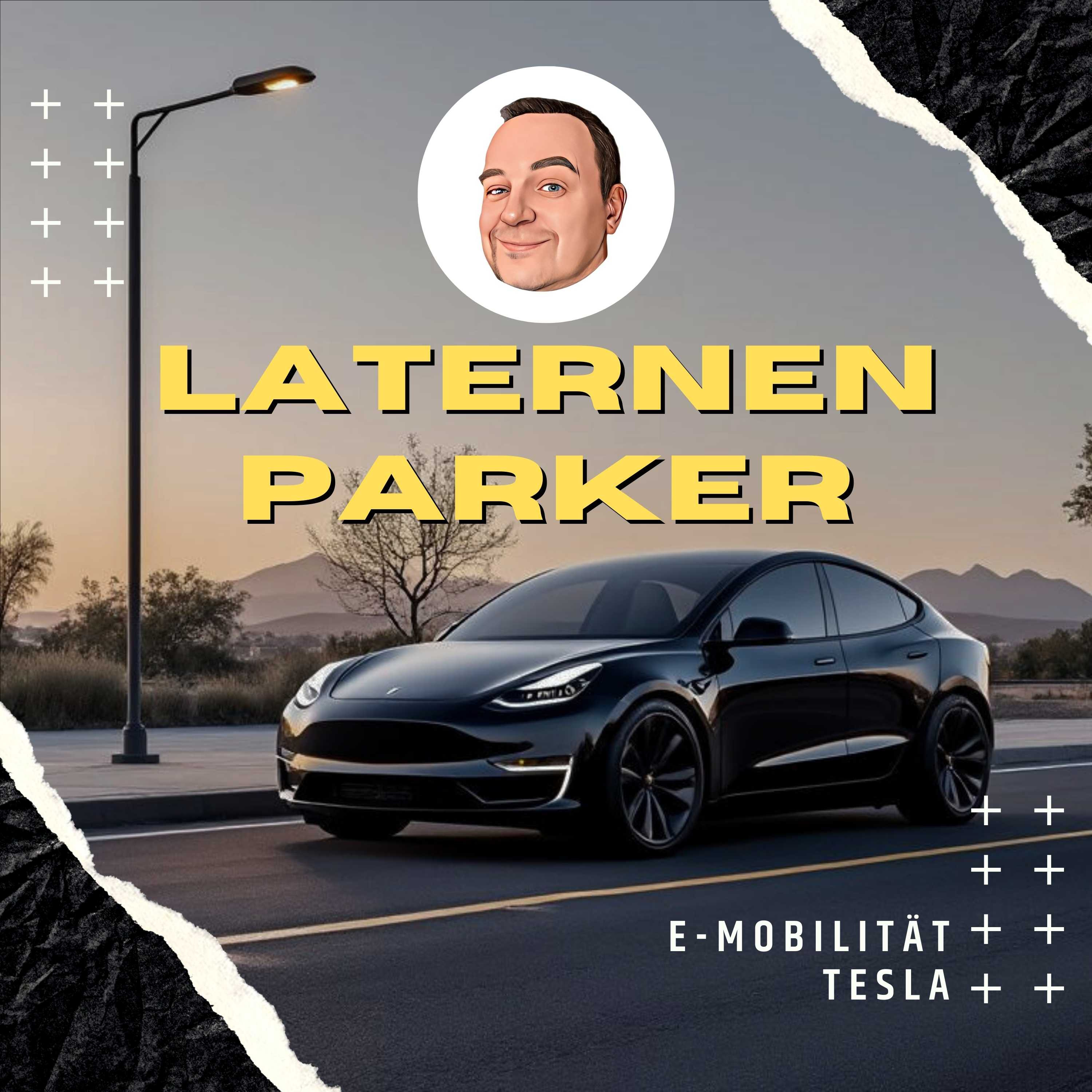
Laternenparker: E-Mobilität und TeslaVon 7 km/h-Zonen bis UNECE-Wahnsinn: Deutschland in ZeitlupeEuropa diskutiert, Tesla entwickelt – und Deutschland verheddert sich in Formularen:⚙️ KBA-Liste zeigt dutzende Hersteller mit Testgenehmigungen, aber kein Tesla – warum?🇪🇺 FSD-Tests laufen über Sonderwege via Niederlande (RDW) – während UNECE & BMW die Regulierung bremsen.📉 Bürokratie & Behördenwirrwarr: KBA, UNECE, RDW – keiner weiß, wer eigentlich zuständig ist.💡 Investor Day 2025: Elon wird konkret zu KI, Chips, Optimus & FSD – viel Substanz, wenig Show.🏘️ Micha erzählt, wie Bürokratie im Kleinen anfängt: 7 km/h-Tempolimit im Dorf – „für mehr Begegnungen“.🤯 Fazit: Vom Ortsschild bis zur UNECE – alle wollen regeln, keiner versteht, was sie blockieren.💬 Schreib uns in die Kommentare:Wo siehst du den größten Bremsklotz für Fortschritt – P...
2025-11-121h 03
科技前緣2025/10/20 Tesla FSD V14 衝擊波:純視覺 AI 的極限挑戰與算力晶片三國戰 (vs. NVIDIA vs. Qualcomm)🎙️ 節目摘要
本集深入解析自動駕駛兩大技術路線:Tesla FSD V14/Supervised 的「端到端」純視覺 AI,與 Waymo/Cruise 的「多感測器融合」(LiDAR、雷達、攝影機)。我們將探討 FSD V14 如何透過 10 倍參數規模的神經網路模型和 Mad Max/Sloth 等新模式,顯著提升停車及應對緊急車輛能力。同時,節目將聚焦硬體競爭:NVIDIA (DRIVE Thor/Orin) 如何以 2000 TOPS 算力與「雲到車」方案領跑 L3+ 市場,以及 Qualcomm (Snapdragon Ride Flex) 如何利用「艙駕融合」策略加速 ADAS 普及。最後,我們將討論自動駕駛在網路安全、功能安全 (SOTIF) 及弱勢道路使用者 (VRUs) 感知公平性等方面的倫理與法規挑戰。
📌 重點整理 Key Points
Tesla V14 AI 大躍進:採用 10 倍大 AI 模型與端到端神經網路,提升駕駛流暢度、停車能力,新增 Sloth 和 Mad Max 等駕駛模式。
感測器路線爭議:Tesla 堅持「純視覺」路線,但面臨冗餘性及惡劣天氣下可靠性風險;競爭者則採 LiDAR/雷達/攝影機多感測器融合,提升 L4 級無人駕駛安全性。
算力硬體競爭:NVIDIA 以 DRIVE Thor 的 2000 TOPS 算力瞄準 L4/Robotaxi 市場;Qualcomm Snapdragon Ride Flex 晶片實現座艙與駕駛融合,降低成本並達 ASIL-D 安全標準,加速 ADAS 普及。
安全與公平性挑戰:自動駕駛需遵循 ISO 26262/SOTIF 標準應對風險。此外,訓練數據集缺乏代表性導致系統對輪椅使用者或導盲犬等 VRUs 偵測準確度較低,亟需法規要求提升感知公平性。
📚 延伸閱讀/相關連結
一、 研究論文與學術報告
A Review of Cybersecurity Challenges and Solutions for Autonomous Vehicles (The Science and Information (SAI) Organization, 2025, Vol. 16, No. 2)
Autonomous Vehicle Pedestrian Detection: Minimum Safety Standards Needed to Protect Disabled Road Users (International Journal of Scientific Research & Engineering Trends (IJSRET), Sep-Oct 2025, Volume 11, Issue 5)
End-to-End Deep Learning for Self-Driving Cars (NVIDIA Technical Blog, Aug 17, 2016)
Taxonomy and Definitions for Terms Related to Driving Automation Systems for On-Road Motor J3016_202104 (SAE International, 2021 年 4 月)
The Cityscapes Dataset for Semantic Urban Scene Understanding (Computer Vision Foundation (Cordts, M., et al.), 2016)
Bias Behind the Wheel: Fairness Analysis of Autonomous Driving Systems (arXiv preprint (Li, Z., et al.), 2023)
The social dilemma of autonomous vehicles (Science (Bonnefon, Jean-François/Shariff, Azim/Rahwan, Iyad), 2016)
Autonomous Driving: Technical, Legal and Social Aspects (Springer (M. Maurer, B. Lenz, H. Winner, and J. C. Gerdes), 2016)
Perception, Planning, Control, and Coordination for Autonomous Vehicles (Machines (Pendleton et al.), 2017)
二、 官方文件與國際標準 (功能安全與法規)
Ethics Commission Automated...
2025-10-2025 min
Laternenparker: E-Mobilität und TeslaBürokratie killt Fortschritt: Autonomes Fahren in Deutschland - Tesla FSD & UNECEUN-Behörden, endlose Abstimmungen, sechsmonatige Pausen – so sieht Bürokratie aus, wenn es um Teslas Full Self Driving in Europa geht. Während FSD in den USA, Australien und China längst Realität ist, soll es hier frühestens 2027 kommen.👉 Wir nehmen das Protokoll der UNECE auseinander, zeigen, welche Lobbyinteressen im Spiel sind, und diskutieren, warum Europa im autonomen Fahren droht, komplett abgehängt zu werden.Sag uns in den Kommentaren: Glaubst du, dass FSD wirklich 2027 kommt?Den Video-Podcast findest du hier: https://youtu.be/1mgwsLn148sX:https...
2025-09-021h 14
The Lexy Show: Fashion That Gives A DamnHaute Talk with Paola DedaIn this episode of The Lexy Show, we’re honored to welcome Paola Deda, Director of the Forest, Land, and Housing Division at the United Nations Economic Commission for Europe (UNECE) and chairperson of the UN Alliance for Sustainable Fashion.Paola guides us through:How her role at UNECE supports sustainable land use and environmental planning at a global scale .The work of the UN Alliance for Sustainable Fashion, including her role as jury chair for the 2025 Sustainable Fashion Awards—honoring excellence in circularity, craftsmanship, and social impact in the fashion industry .Her vi...
2025-08-2841 min
Ahmad HardyoniPdf [download] Transboundary Freshwater Ecosystems in International Law: The Role and Impact of the UNECE Environmental Regime by Ruby Moynihan on Audiobook New VersionLink To Download : https://booklibraryed.com/?book=1108490700
Available versions: EPUB, PDF, MOBI, DOC, Kindle, Audiobook, etc.
Reading Transboundary Freshwater Ecosystems in International Law: The Role and Impact of the UNECE Environmental Regime
Download Transboundary Freshwater Ecosystems in International Law: The Role and Impact of the UNECE Environmental Regime
PDF/EBooks Transboundary Freshwater Ecosystems in International Law: The Role and Impact of the UNECE Environmental Regime
You Can Download Or Read Free Books
2025-08-2600 min
Ahmad HardyoniPdf [download] Transboundary Freshwater Ecosystems in International Law: The Role and Impact of the UNECE Environmental Regime by Ruby Moynihan on Audiobook New VersionLink To Download : https://booklibraryed.com/?book=1108490700
Available versions: EPUB, PDF, MOBI, DOC, Kindle, Audiobook, etc.
Reading Transboundary Freshwater Ecosystems in International Law: The Role and Impact of the UNECE Environmental Regime
Download Transboundary Freshwater Ecosystems in International Law: The Role and Impact of the UNECE Environmental Regime
PDF/EBooks Transboundary Freshwater Ecosystems in International Law: The Role and Impact of the UNECE Environmental Regime
You Can Download Or Read Free Books
2025-08-2600 min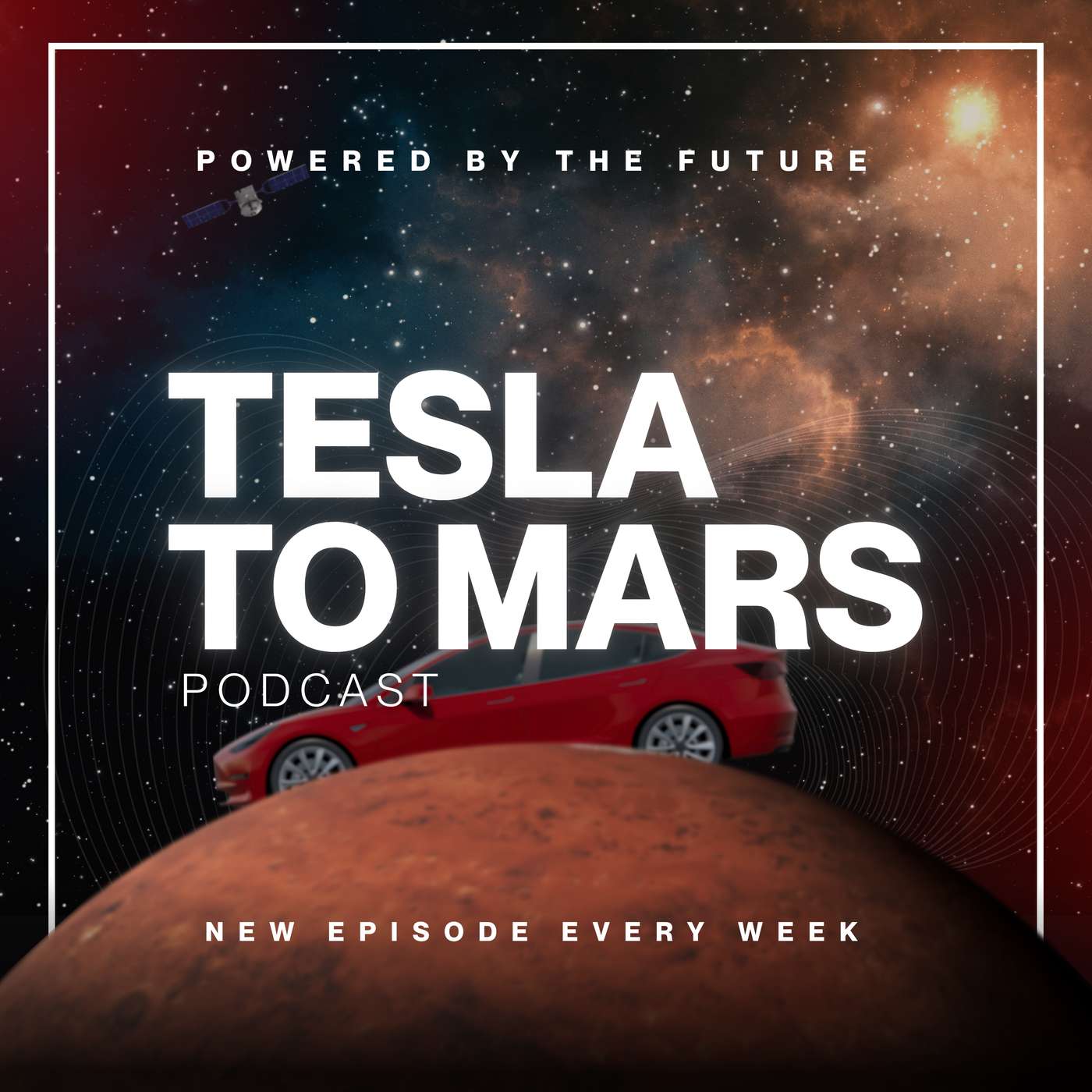
Tesla to Mars - The PodcastTesla to Mars #43 - Elon vs Trump: Feud or Fake? The Real Game Behind the $7 Trillion BillThis week on Tesla to Mars: Are Elon and Trump really at war—or is this just political theater? We dive into the “big, beautiful bill”, Mars ambitions, and the shadow chess game between EU, UNECE, and Tesla’s FSD revolution.In Episode 43, Demian, Florian & Kees unpack what’s really going on behind the headlines—from deleted tweets to backdoor strategy. As Tesla makes major moves in Austin and gets listed as an autonomous operator in Texas, are we witnessing the soft launch of the RoboFleet?We explore:🚨 The Elon–Trump “feud”: what’s real, what’s noise
2025-06-111h 14
Deep Tech TalkSeason 5 I Episode 4 I How Cybersecurity is Steering the Automotive IndustryIn this episode of Deeptech Talk, we explore the fast-moving world of automotive cybersecurity—where innovation, AI, and regulation intersect to protect the next generation of vehicles. From real-world car hacks to global cybersecurity mandates like UNECE’s R155/R156, we break down the growing threats and the groundbreaking solutions reshaping the auto industry. Hear how companies like Denso, NTT, Argus, and Elektrobit are leading the charge, and why collaboration across OEMs, cybersecurity firms, and regulators is crucial. If you’re interested in smart mobility, AI, and the fu...
2025-04-2407 min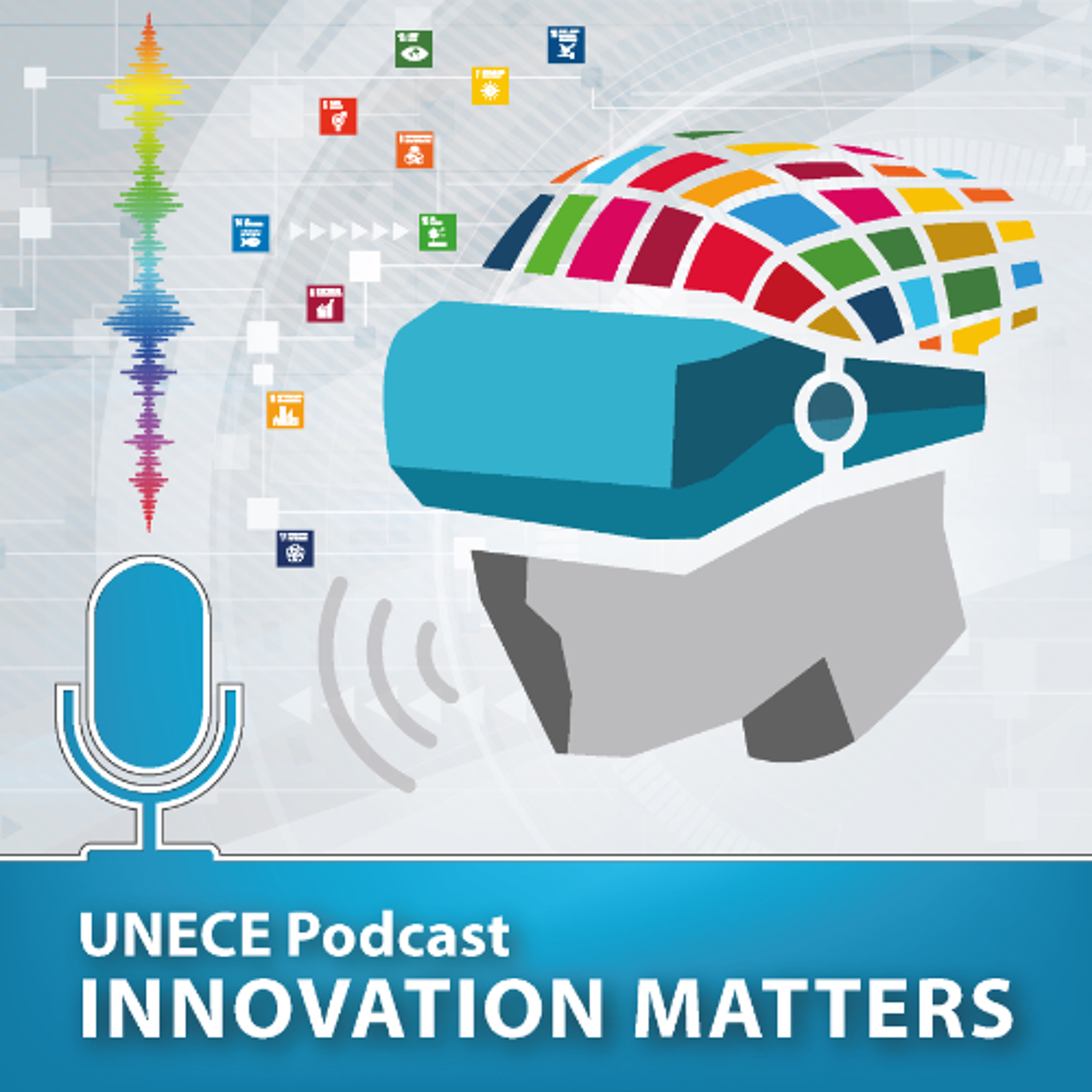
UNECEInnovation Matters: New Innovation PolicyAs the complexities of modern economies grow, traditional approaches to industrial policy face increasing scrutiny. For decades, debates have raged about how governments can intervene to foster innovation, address market failures, and create sustainable development paths. Today, industrial policy has undergone a transformation, and now embraces elements of market liberalism.
In this episode of Innovation Matters, Professor Michael Munger from Duke University explores these issues, suggesting that industrial policy often oscillates between two extremes: setting the foundational rules of the game for markets to thrive and directly managing industry outcomes through subsidies, regulations, or nationalization. He highlights the inherent tensions in...
2024-12-131h 12
UNECEInnovation Matters: the Future of Legal Infrastructure (Part 2)As the pace of technological change accelerates, the limitations of our existing legal systems are becoming increasingly apparent. Traditional frameworks, designed for a slower and less complex world, struggle to keep up with the challenges posed by globalization, digitalization, and emerging technologies. There is a growing need for innovative approaches to lawmaking that can support both the rapid pace of innovation and the protection of societal values.
In this episode, Profesor Gillian Hadfield from the University of Toronto discusses the importance of reimagining legal infrastructure to better align with the demands of our rapidly changing world.
2024-11-2945 min
UNECEBridging the gap: intergenerational equity in resource managementUNECE explores issues around sustainable resource management and intergenerational equity with Jodi-Ann Wang, Grantham Research Institute, London School of Economics (LSE), member of UNECE's Resource Management Young Member Group (RMYMG).
2024-11-2035 min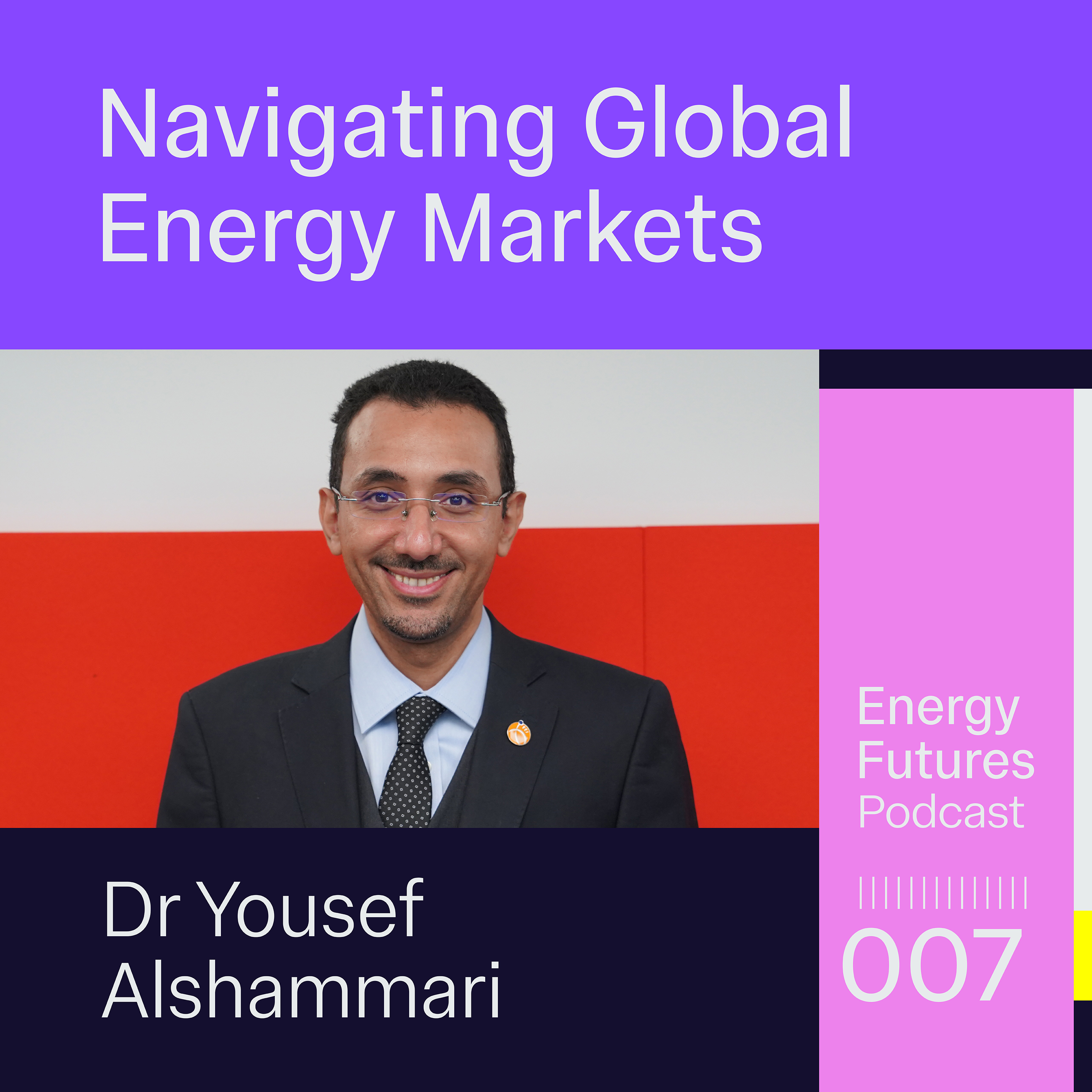
Energy Futures PodcastNavigating Global Energy Markets| Ep7: Yousef AlshammariShow Notes: Episode 7 - Navigating Global Energy Shifts Host: Lukas Schirren, MSc student, Sustainable Energy Futures, Imperial College London Guest: Dr. Yousef Alshammari, CEO of CMarkits, Energy Strategist In this episode, Lukas Schirren speaks with Dr. Yousef Alshammari about the global shifts affecting energy markets, from COVID-19’s impact to geopolitical changes. They delve into the interplay between fossil fuels and renewables and discuss how to navigate these complexities toward a sustainable future. Dr. Alshammari shares insights from his career as an award-winning energy analyst and offers guidance on addressing the challe...
2024-11-0455 min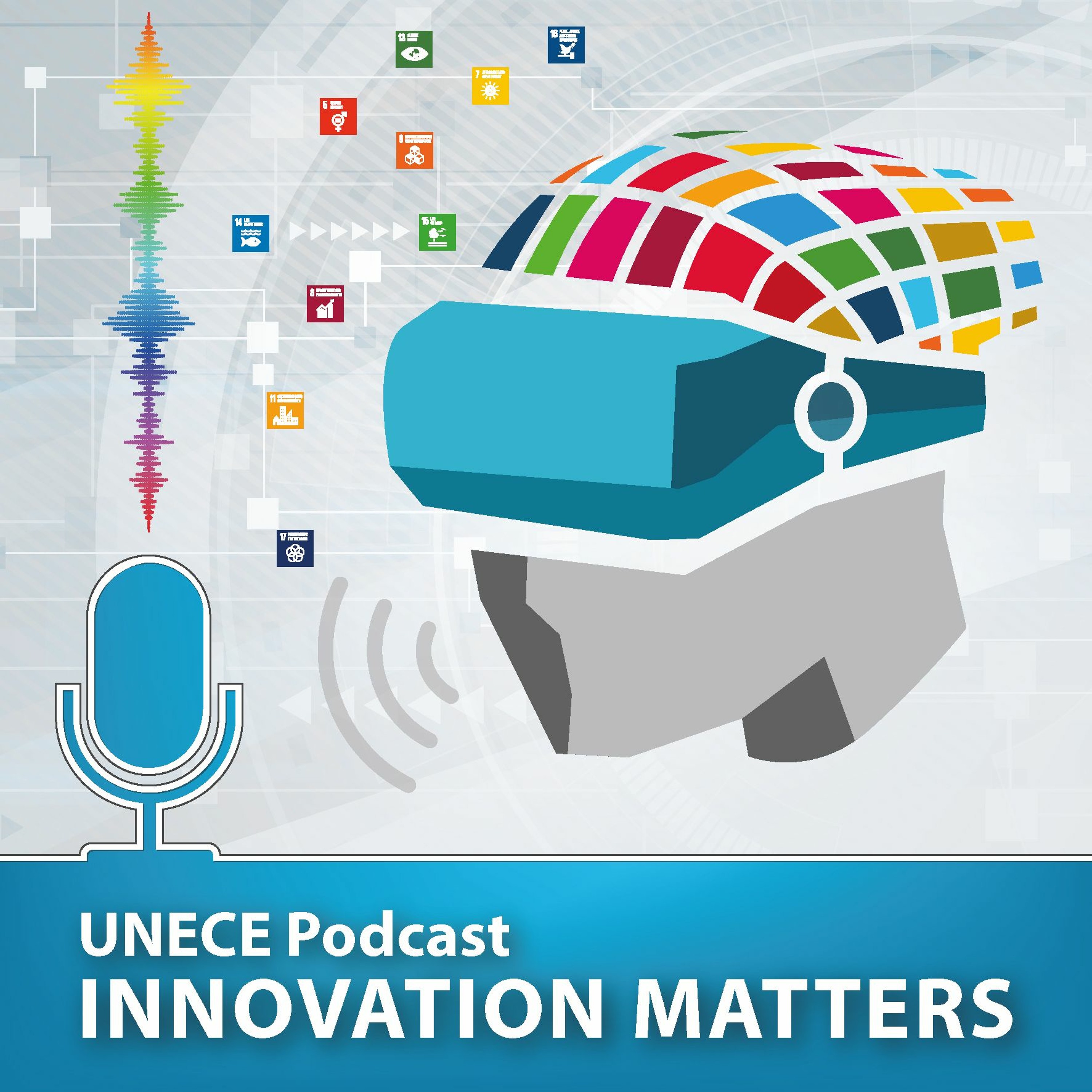
UNECEInnovation Matters: the Future of Legal Infrastructure (Part 1)In this episode of Innovation Matters, Professor Gillian Hadfield from the University of Toronto, discusses the importance of reimagining legal infrastructure to better align with the demands of our rapidly changing world.
She explores the concept of using market mechanisms to drive legal innovation, emphasizing how regulatory markets can help create more responsive and effective legal systems.
2024-10-2254 min
EFS PodcastSeason 3 - #17 Sicherheit 4.0: Neue Cybersecurity-Standards für die vernetzte (automobile) Welt | Wolfgang Walter & Daniel BreschanVom autonomen Fahren bis hin zu Cybersicherheitsstandards – Neue Trends und strenge Vorschriften setzen Unternehmen unter Druck. In dieser Episode des EFS Podcasts sprechen Wolfgang Walter, Partner bei EFS Consulting und Chief Information Security Officer (CISO) und Daniel Breschan, Consultant, über die aktuellen Entwicklungen im Bereich des autonomen Fahrens und der Cybersecurity in der Automobilindustrie ein. Gemeinsam mit Host Ralph Zlabinger diskutieren sie, inwieweit jüngste rechtliche Entscheidungen und neue Regelungen, wie die UNECE R157, die Zukunft der Branche beeinflussen. Dabei gehen sie auch näher auf die Herausforderungen und Chancen, die sich für Automobilhersteller und ande...
2024-10-0821 min
UNECEInnovation Matters: BlockchainIn this episode of Innovation Matters, Professor Chris Berg, an economist at the Royal Melbourne Institute of Technology, explores the concept of blockchain as a decentralized database, emphasizing its potential to transform global trade, social media, and even the integration of AI technologies. He delves into current challenges, such as regulatory uncertainties and the complexities of building decentralized networks, while maintaining an optimistic view of the future of the blockchain economy.
2024-09-2757 min
UNECEInnovation Matters: Innovative DynamismFrom the industrial revolution to the digital era, innovation has redefined economies and societies, offering new opportunities and challenges. However, balancing the promotion of innovation with the need for responsible oversight remains a key issue for governments, businesses, and communities.
In this episode of Innovation Matters, Arthur Diamond, Professor of Economics at the University of Nebraska Omaha, shares his insights on innovative dynamism — where technological advancements drive significant transformation. We explore the historical evolution of innovation, comparing the more open, dynamic environment of the 19th century with the increasing role of state-led regulation that emerged in the 20th century, particularly af...
2024-09-181h 03
UNECEInnovation Matters: Resource Efficiency and AvailabilityThis episode of Innovation Matters explores with Marian Tupy of the Cato Institute’s Center for Global Liberty and Prosperity how innovation has helped to expand the resource base and improve living standards, even as the global population has grown.
The discussion highlights historical and contemporary examples of how innovation can increase resource efficiency and availability, providing an optimistic view of our future and the role of technology in addressing today’s challenges. It also delves into the broader implications for sustainability and future development.
2024-07-2656 min
UNECEInnovation Matters: Exploring the Evolutionary Theory of EconomicsWe often see innovation as a linear process – from basic research over invention to innovation. But is that how knowledge develops and how innovation works? Could the concept of evolution help elucidate the dynamics better? How would such a perspective explain how knowledge evolves into, adapts to, and underpins societal and economic transformation? And what does that mean in practice, for entrepreneurship, policy, and how society works?
Innovation Matters explores these questions with Prof. Jason Potts of the Royal Melbourne Institute of Technology, who explains the importance of understanding the evolutionary nature of knowledge and how this perspective can inform po...
2024-07-021h 12
UNECEInnovation Matters: Open InnovationIn the past two decades, Open Innovation and its relatives, such as Open Science, have come to the fore as a paradigm contrasting with the view of innovation as something emerging from within firms. Referring to the practice of sourcing ideas from external sources and sharing valuable information widely, Open Innovation is essential to the creation of a broader innovation commons and to understanding a range of emergent phenomena that turn the traditional view on its head.
As Prof. Henry Chesbrough, Berg Professor of Open Innovation and Sustainability at LUISS University of Rome, explains in Innovation Matters, this potential is...
2024-06-201h 10
UNECEInnovation Matters - the Innovation RenaissanceInnovation has created huge wealth and opportunities over the past two centuries, and since the mid-20th century in particular. But over the past decades, many point to stagnating productivity. That makes it all the more important to aim for a fundamental reconceptualization and rebirth of innovation for the future.
In this episode, Prof. Alex Tabarrok argues that by embracing a culture of growth and significantly reforming education, intellectual property laws, and bureaucratic regulations, societies can reignite the kind of innovation that drives substantial economic advances and improves the standard of living worldwide.
Prof. Alex Tabarrok holds the Bartley J...
2024-05-151h 11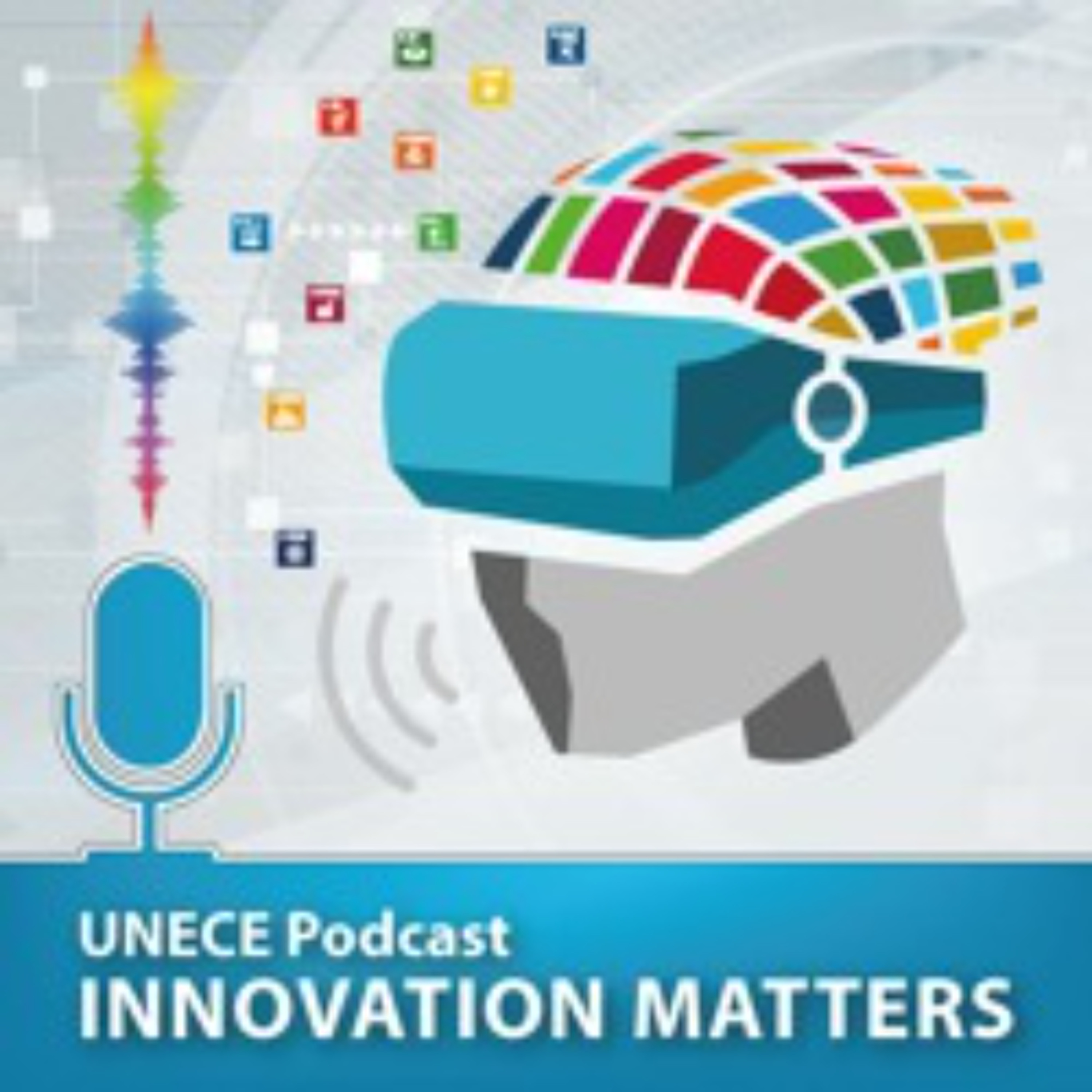
UNECEInnovation Matters - Innovation policyIn this episode of Innovation Matters, we delve into the complex interplay between government policies, market dynamics, and transformative innovation with Dr. Anders Kärnä. As we navigate through the nuances of economic development and public policy, Dr. Kärnä offers a critical analysis on how governments can either foster or hinder innovation through industrial policies. Drawing from historical examples and current economic theories, this episode explores the delicate balance between governmental intervention and market freedom that underpins successful innovation ecosystems worldwide.
2024-05-0144 min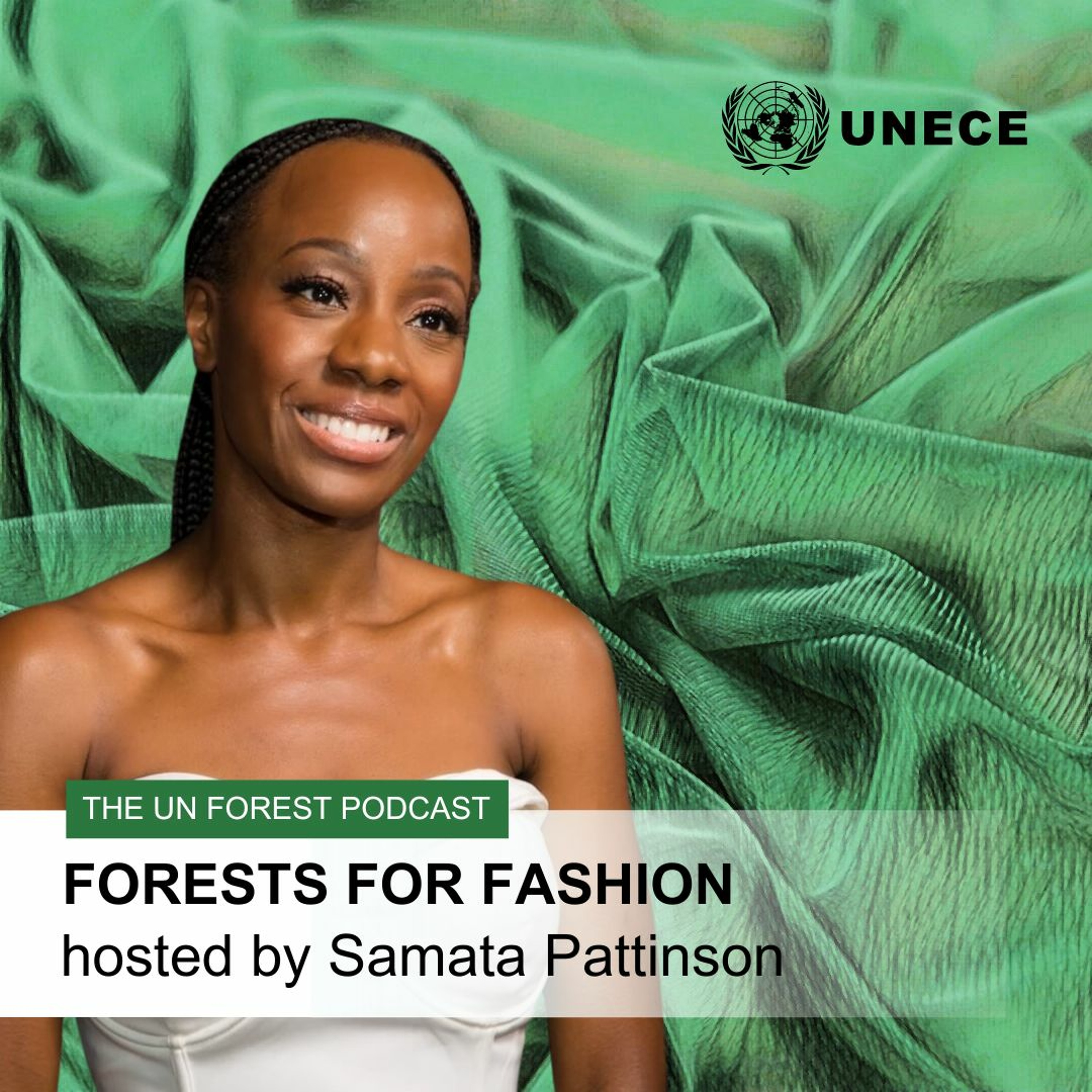
UNECEForests For Fashion hosted by Samata Pattinson - the UN Forest PodcastSustainability is a pressing concern in the fashion and textile industry.
In this episode of “The UN Forest Podcast”, host Samata Pattinson is joined by Åsa Degerman, Ben Selby and Carlo Covini to discuss the transformative role of forests and new technologies in making fashion more sustainable and circular.
------------------------------------------------------------------
About the UN Forest Podcast
The UN Forest Podcast is a series produced by the Joint UNECE/FAO Forestry and Timber Section to showcase that the potential of forests goes beyond trees. Each episode features special guests and speakers who bring insights on forests as our strongest allies in fighting clima...
2024-04-1934 min
EFS PodcastSeason 3 - #3 Vorsprung durch UNECE R155. Sind Fahrzeuge eigentlich sicher vor Hackern? | Daniel Breschan & Patrick SmudaSind Fahrzeuge eigentlich sicher vor Hackern? Mit der Vernetzung und Digitalisierung von Fahrzeugen ist diese Fragestellung für Fahrzeughersteller und Lieferanten in den Fokus gerückt. Spätestens ab Mitte 2024 ist die Auseinandersetzung mit dieser Frage unumgänglich – ab dann besteht nämlich eine regulatorische Verpflichtung zum Aufbau eines Cybersicherheitsmanagementsystems durch die neue UNECE Regelung Nr. 155. In dieser Episode des EFS Podcast diskutieren Daniel Breschan und Patrick Smuda mit Host Ralph Zlabinger zu den neuen UNECE Anforderungen und den dringenden Handlungsbedarf für OEMs und Lieferanten – von der sicheren Entwicklung der Fahrzeugsoftware bis hin zum Car Security Incident Ma...
2024-03-2623 min
UNECEInnovation Matters: Capitalism and InnovationIn this episode of Innovation Matters, we delve into the relationship between capitalism, innovation, and societal progress with Dr. Rainer Zitelmann.
Through a historical lens and contemporary examples, this episode explores how capitalist dynamics have fostered technological breakthroughs, economic development, and contributed to improved standards of living for billions globally.
2024-03-151h 14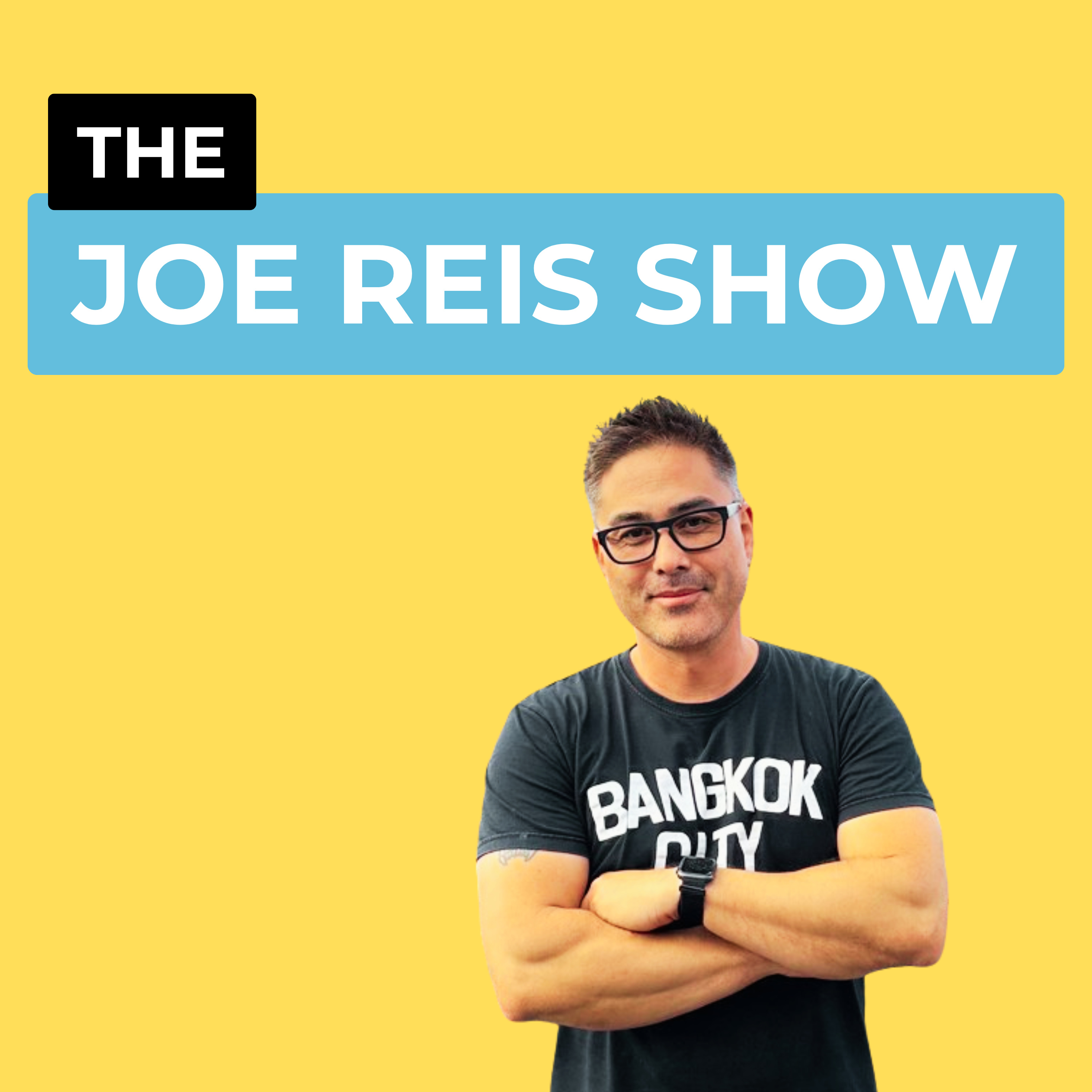
The Joe Reis ShowZach Zeus - Trust Architecture, ESG, and MoreZach Zeus and I chat about trust architecture and how it can work to improve ESG impacts in supply chain. This is an incredibly important topic with massive global impact, cuz climate change.
LinkedIn: https://www.linkedin.com/in/zachary-zeus/
Recommendation 49: https://unece.org/circular-economy/news/unece-support-scaling-transparency-sustainable-value-chains
2024-03-0555 min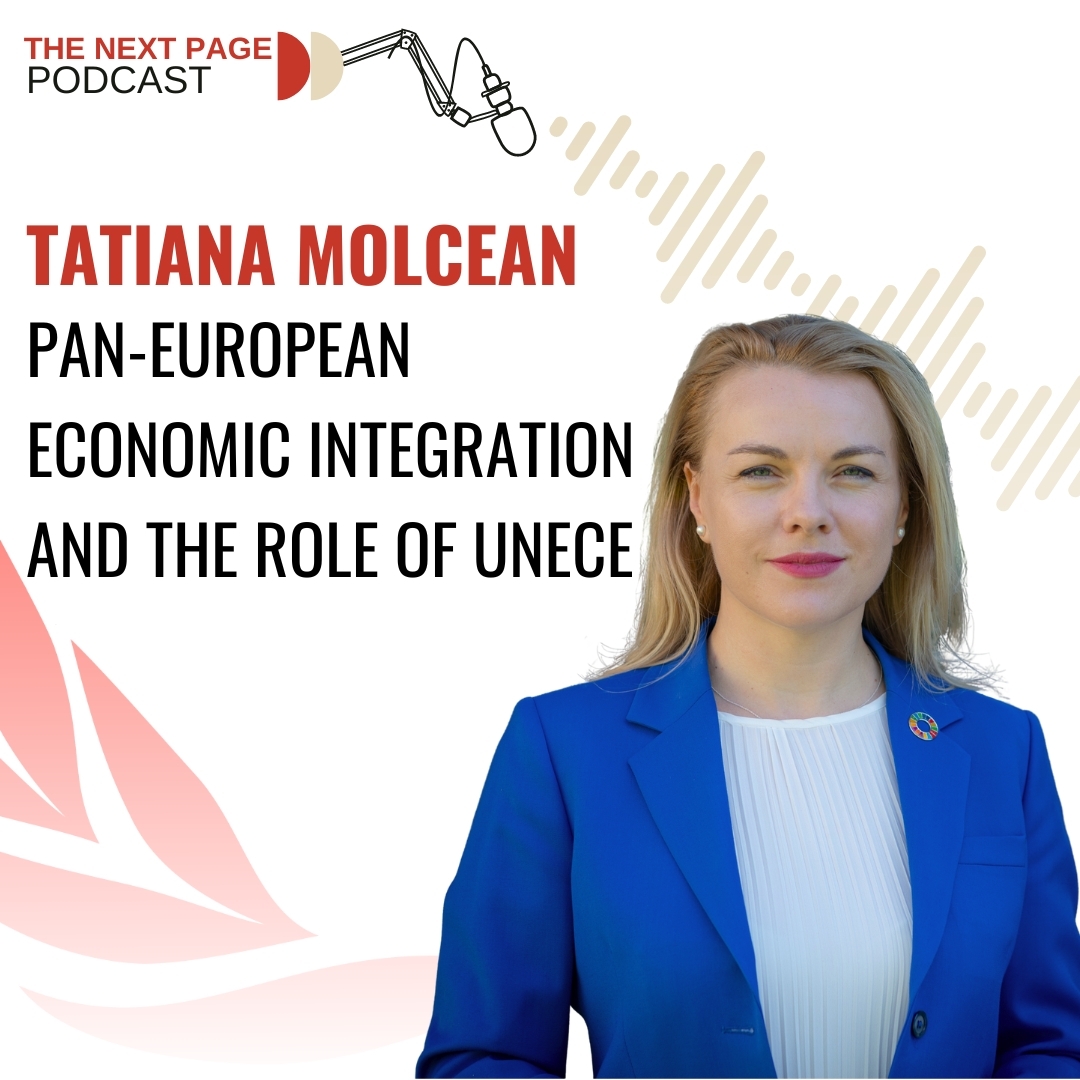
The Next PagePan-European economic integration and the role of UNECEA conversation with Under-Secretary-General Tatiana Molcean, Executive Secretary of UNECE
The United Nations Economic Commission for Europe (UNECE) is one of the five Regional Commissions of the United Nations. ECE was set up in 1947 to promote pan-European economic integration. Francesco Pisano met with UNECE’s new Executive Secretary, Ms. Tatiana Molcean for a conversation on the role of the Commission and how it serves multilateralism. They also talk about the vision for European economic integration and the challenges currently facing the wider European region.
Resources
UNECE website:
https://unece.org/
...
2024-02-2338 min
UNECEInnovation Matters: the Politics of InnovationIn this episode, we delve into the question of why certain countries excel in innovation while others, with similar resources, do not achieve the same level of success. In conversation with Dr. Mark Zachary Taylor of the Georgia Institute of Technology, Innovation Matters sheds light on the complex factors beyond institutions and policies that drive national innovation strategies.
2024-02-141h 03
UNECEInnovation Matters: The Legacy of the Industrial Revolution (Part 2)In the previous episode of Innovation Matters on the industrial revolution with Professor Emma Griffin, we explored how innovative dynamism changed our word radically in a process still going on today. This second episode explores what life was like for the working class. Often maligned as squalid and dehumanizing, Emma Griffin delves into a range of autobiographies telling a different, much more nuanced story of optimism, perspectives, and dynamism.
2024-01-1041 min
De Nieuwe WereldNederland: meer asfalt en stenen dan natuur | Een gesprek met Roland BobbinkJurgen Tiekstra in gesprek met bioloog en stikstofdeskundige Roland Bobbink, die al veertig jaar onderzoek doet naar de effecten van stikstof op kwetsbare natuurgebieden. Maar wat is natuur eigenlijk in Nederland? Zijn we met het in stand houden van droge heide niet bezig met een soort monumentenzorg? Roland Bobbink vindt van niet: "Er is gewoon teveel stikstof in stikstofgevoelige natuur".
Bronnen en links bij deze uitzending:
Wikipedia over celtic fields, of raatakkers: https://nl.wikipedia.org/wiki/Raatakker
De Plagger - Van Kooten en De Bie: https://www.youtube.com/watch?v=6L-dJjc9moI
Download 'Silent Spring', Rachel Carson, 1972...
2024-01-021h 11
UNECEInnovation Matters: The Legacy of the Industrial Revolution (Part 1)In the mid-18th Century, the modern economy started to take shape. While limited to the invention of the factory system and the boom in the textile sector for the first decades, the Industrial Revolution brought unprecedented social and economic changes. Marking, in the words of prominent historian Eric Hobsbawn, “the most fundamental transformation of human life in the history of the world”, the innovative dynamism and legacy the industrial revolution created is alive and well today. In this episode of Innovation Matters, Professor Emma Griffin explains what prompted and upheld the industrial revolution and the innovative dynamism it paved the...
2023-12-2048 min
UNECEInnovation Matters: Regulation and Innovation (Part 2)In this episode of Innovation Matters, we expand on the previous conversation with Adam Thierer, Senior Research Fellow with the R. Street Institute’s technology and innovation team, about the present and future of regulation in an era of unprecedented innovation. In Part 2, our focus is on the contemporary landscape of legislation, and the balance between permissionless innovation and effective governance. As the pace of technological advancement accelerates, we explore the challenge of reconciling rapid change with the traditional pace of legislation, particularly in the context of digitization.
2023-12-0637 min
UNECELaw and incentivising innovation in the age of digitalizationScientific and technological innovations frequently put the spotlight on the laws that govern them. In this episode of Innovation Matters, Professor Robin Feldman explains why the protection of invention arrangements can cause trouble and, in many ways, end up acting as a disincentive to innovation.
The very nature of inventions makes them impossible to describe unambiguously for all time. When something is so new that we do not understand yet how it works, what it can do, or how it could be applied - as is often the case in biotechnology - description is necessarily slippery. Instead of hoping for...
2023-11-221h 00
UNECEInnovation Matters: Regulation and Innovation (Part 1)In this episode of Innovation Matters, we explore the intricate dynamics of regulation and innovation with Adam Thierer, Senior Research Fellow with the R. Street Institute’s technology and innovation team. He discusses the evolution of 'permissionless innovation' and its influence on past, present, and future technological progress. Drawing insights from his book "Permissionless Innovation: The Continuing Case for Comprehensive Technological Freedom", we embark on a journey to understand how various advancements have flourished without restrictions and impacted the technologies we rely on today.
2023-11-0840 min
UNECEInnovation Matters: Converging Technologies and TransformationIn this episode, Innovation Matters discusses how converging technologies are transforming business, industries, and our lives, with award-winning journalist, entrepreneur, and Executive Director of the Flow Research Collective, Steven Kotler. Our exploration takes us into the heart of how technologies could reshape our lives fundamentally and drive societal and economic transformative innovation.
2023-10-1347 min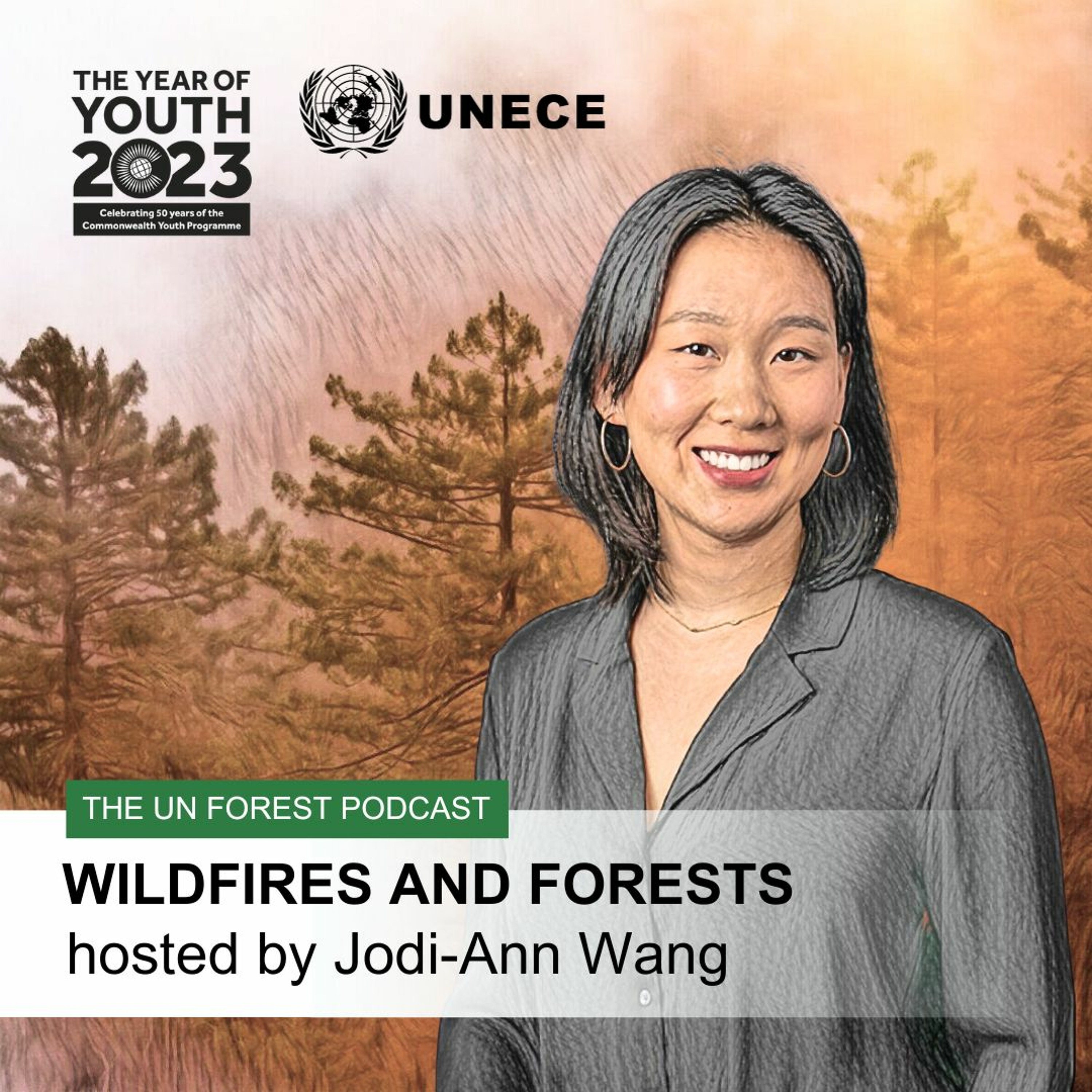
UNECEWildfires and forests hosted by Jodi-Ann Wang - The UN Forest PodcastForest fires are an important part of a healthy ecosystem, but have gotten out of control in recent years. Why are wildfires getting bigger, more intense and lasting longer than ever before?
In this episode of The UN Forest Podcast, Prof. Jesús San Miguel Ayanz joins Jodi-Ann Wang to dive deep into current and future wildfire trends and the role every one of us has in shaping the way forward.
An episode by the United Nations Economic Commission for Europe (UNECE)
-------------------------------------------------------------------
About the UN Forest Podcast
The UN Forest Podcast is a series produced by the Joint UNECE/F...
2023-10-1121 min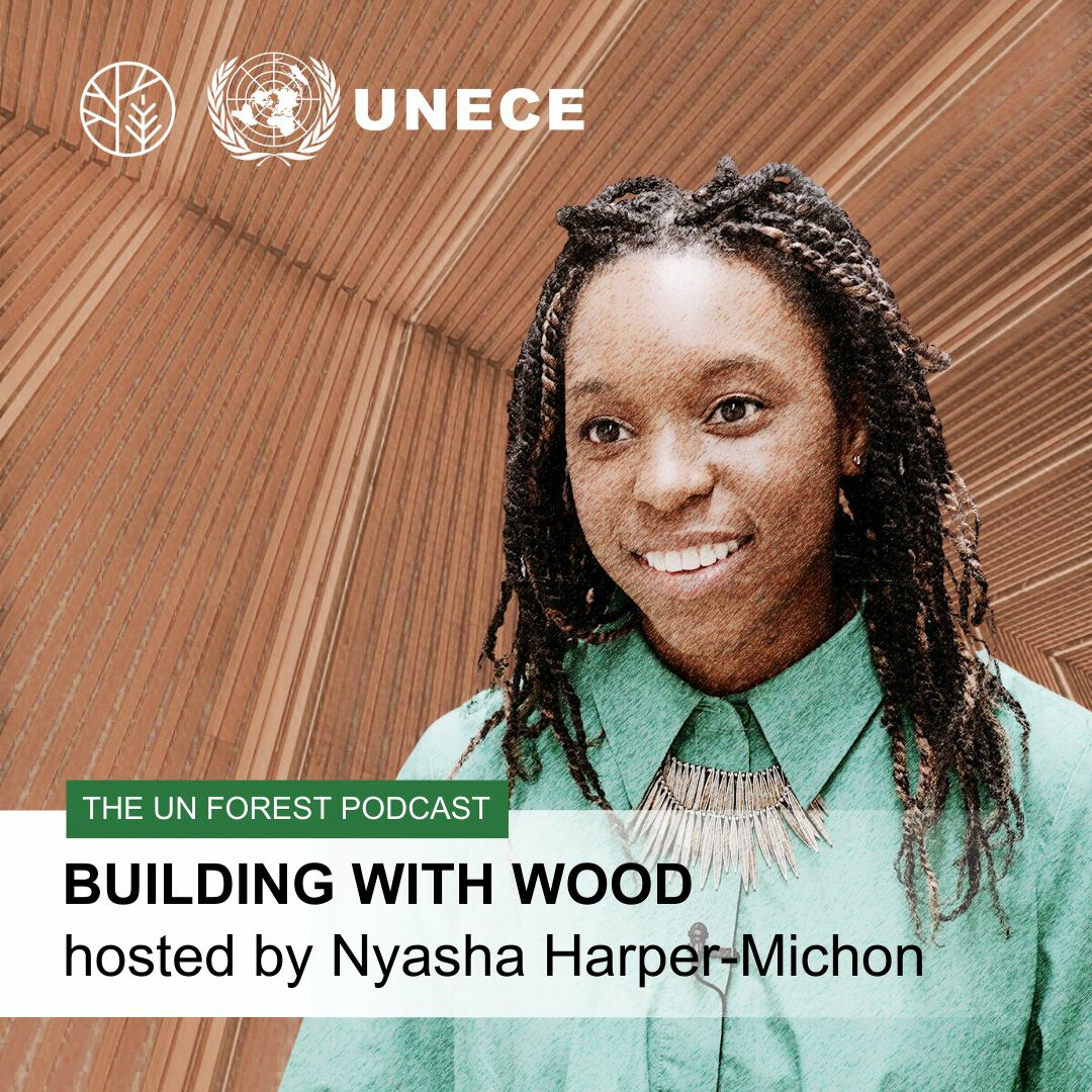
UNECEBuilding with wood hosted by Nyasha Harper-Michon - The UN Forest PodcastThe future of sustainable building is also one of the oldest construction materials around: wood.
In this episode of “The UN Forest Podcast”, Ms. Nyasha Harper-Michon, architect and activist, “archtivist”, and Ms. Sandra Frank, co-founder of Arvet, discuss the advantages of low-carbon, wood construction.
An episode by the United Nations Economic Commission for Europe.
------------------------------------------------------------------
About the UN Forest Podcast
The UN Forest Podcast is a series produced by the Joint UNECE/FAO Forestry and Timber Section to showcase that the potential of forests goes beyond trees. Each episode features special guests and speakers who bring insights on forests as our stro...
2023-09-1319 min
UNECEInnovation Matters: Automation and Utopian Futures?In this episode of Innovation Matters, we embark on an exploration of "Automation and Utopia: Human Flourishing in a World Without Work" with Dr. John Danner, senior lecturer in law at the University of Galway, Ireland.
As we contemplate questions around human obsolescence in the face of automation, we question the potential for a utopian future. In this thought-provoking discussion, he invites us to envision a world where work as we know it will cease to exist and discusses the implications for humanity.
2023-09-0648 min
UNECEInnovation Matters: Shaping long-term societal developmentThis episode of Innovation Matters takes a journey in intellectual archeology with Prof. Philip Auerswald of the George Mason University Schar School of Policy and Government.
Drawing from his books The Coming Prosperity and The Code Economy, and nearly three decades of research relating to entrepreneurship, technology, and innovation on a global scale, Prof. Auerswald shines a light upon the microstructure of long-term societal development.
Prof. Auerswald is the founder and co-editor of Innovations journal, published by MIT Press. He is also the founding board chair and president of the National Center for Entrepreneurship and Innovation, located in Washington, DC...
2023-08-1551 min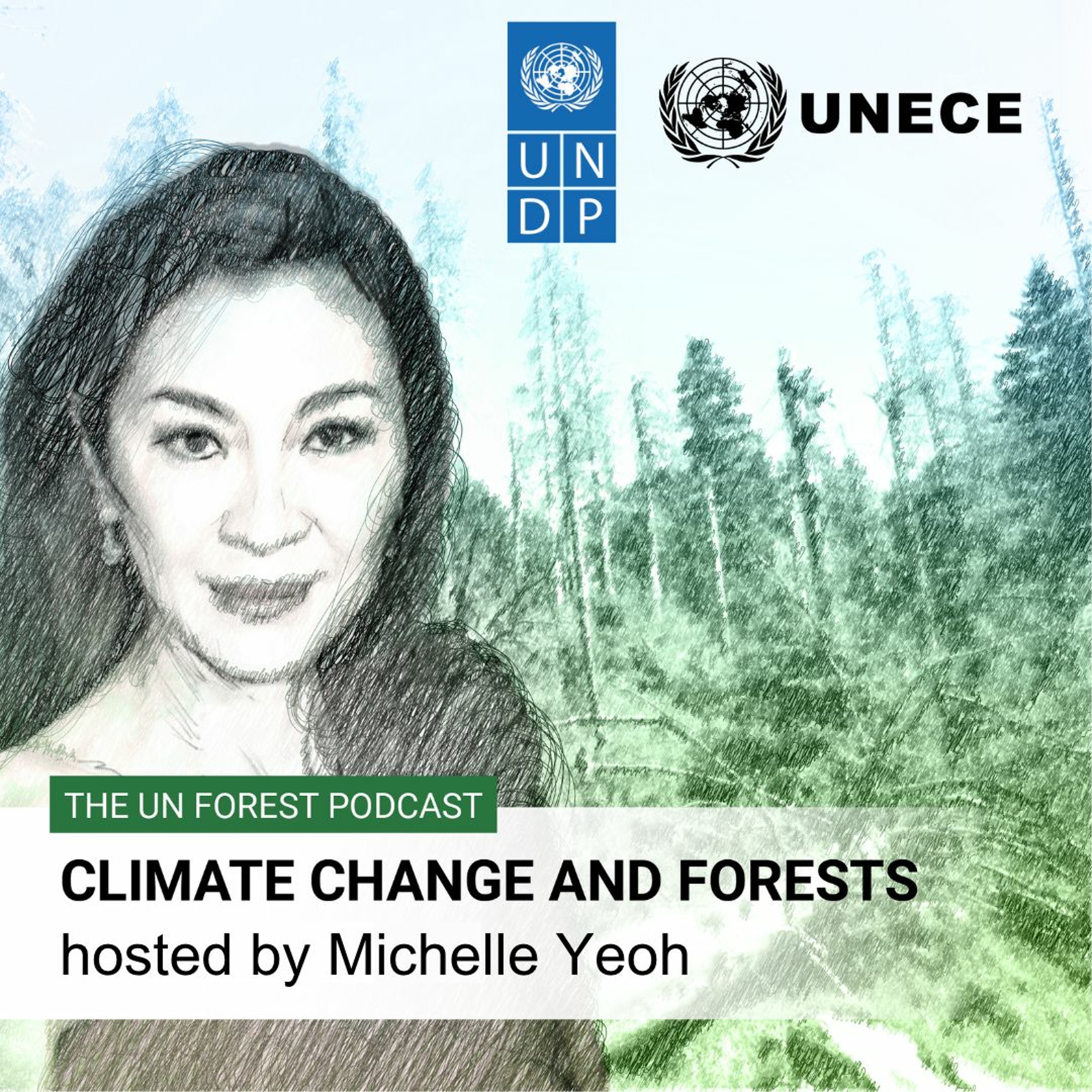
UNECEClimate change & forests hosted by Michelle Yeoh - The UN Forest PodcastForests are one of the solutions to the climate crisis but are also under pressure from climate change itself. What are the strategies to face this complex reality?
In this episode of The UN Forest Podcast, Michelle Yeoh, 2023 Oscar-winning actress and Goodwill Ambassador for the United Nations Development Programme (UNDP), is joined by Professor Almut Arneth, Coordinating Lead Author of the IPCC Special Report on land and climate change, to explore the unique relationship between forests and climate change.
An episode by the United Nations Economic Commission for Europe.
------------------------------------------------------------------
About the UN Forest Podcast
The UN Forest Podcast is...
2023-07-2514 min
PAVEcast: A conversation about autonomous vehiclesPAVE Europe Panel: "AVs and Road Safety: Expectations and Potential Benefits"AVs are expected to be introduced in increasing numbers over the next decades. Moreover, they are expected to have considerable impacts on mobility, safety, the environment and society as a whole.One of the impacts of AVs that is considered is road safety, which is high on the agenda when it comes to mobility planning and management.One of the primary expectations regarding AVs is a substantial reduction in road accidents. The majority of road accidents occur due to human error, such as distracted driving, speeding, or drunk driving. AVs have the potential to eliminate...
2023-07-2157 min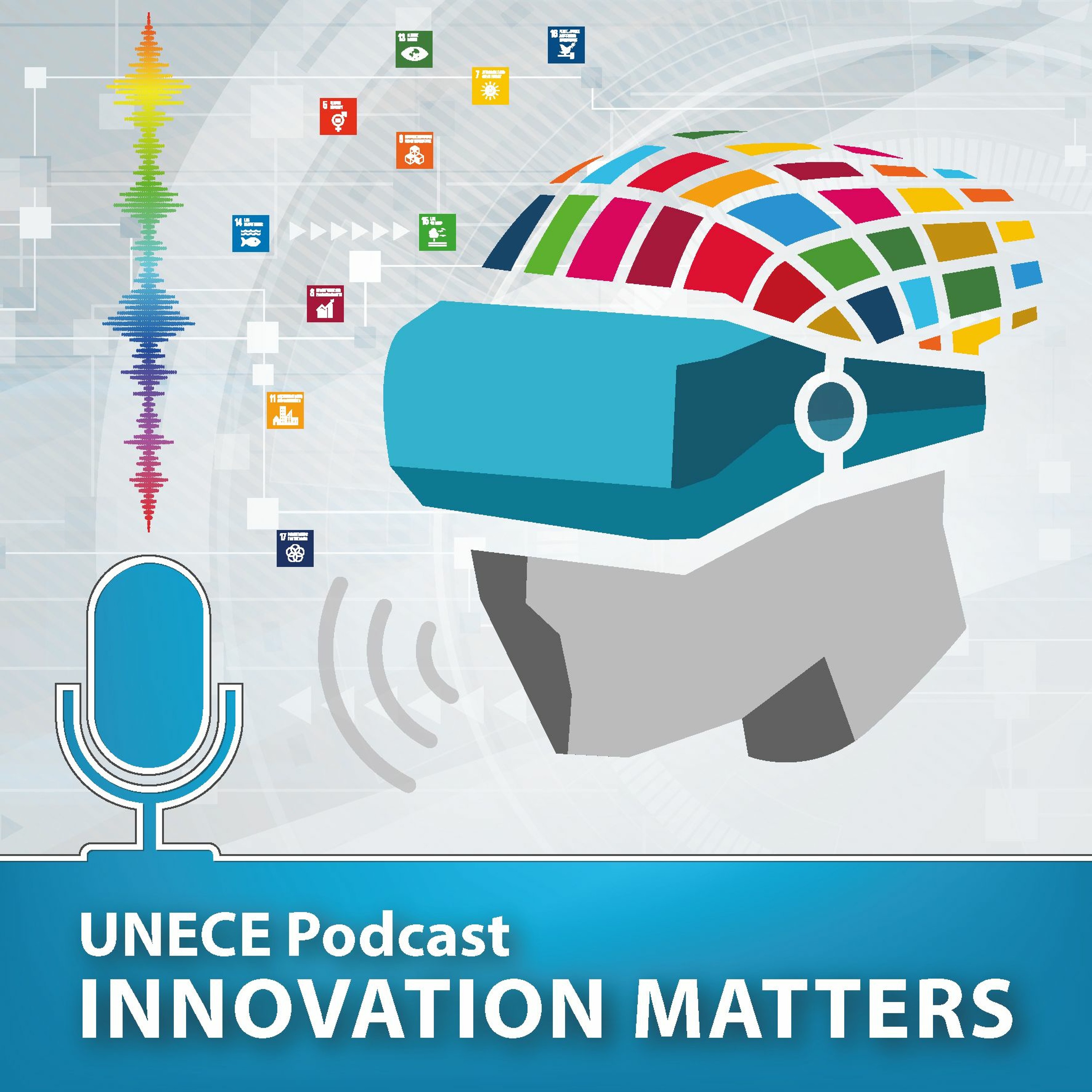
UNECEInnovation Matters: The Role of GovernmentsIn the past decade, there has been a notable rise in government intervention aimed at fostering entrepreneurship and innovation. While some governments were successful in adopting innovation policies to support entrepreneurial activity, others have fallen short.
In this episode, Innovation Matters invites Prof. Josh Lerner, Jacob H. Schiff Professor at Harvard Business School and Co-Director of the HBS Private Capital Project, to explore the historical landscape of government policies and critically analyze their impact on promoting innovation, identifying both positive and negative effects along the way.
2023-07-1347 min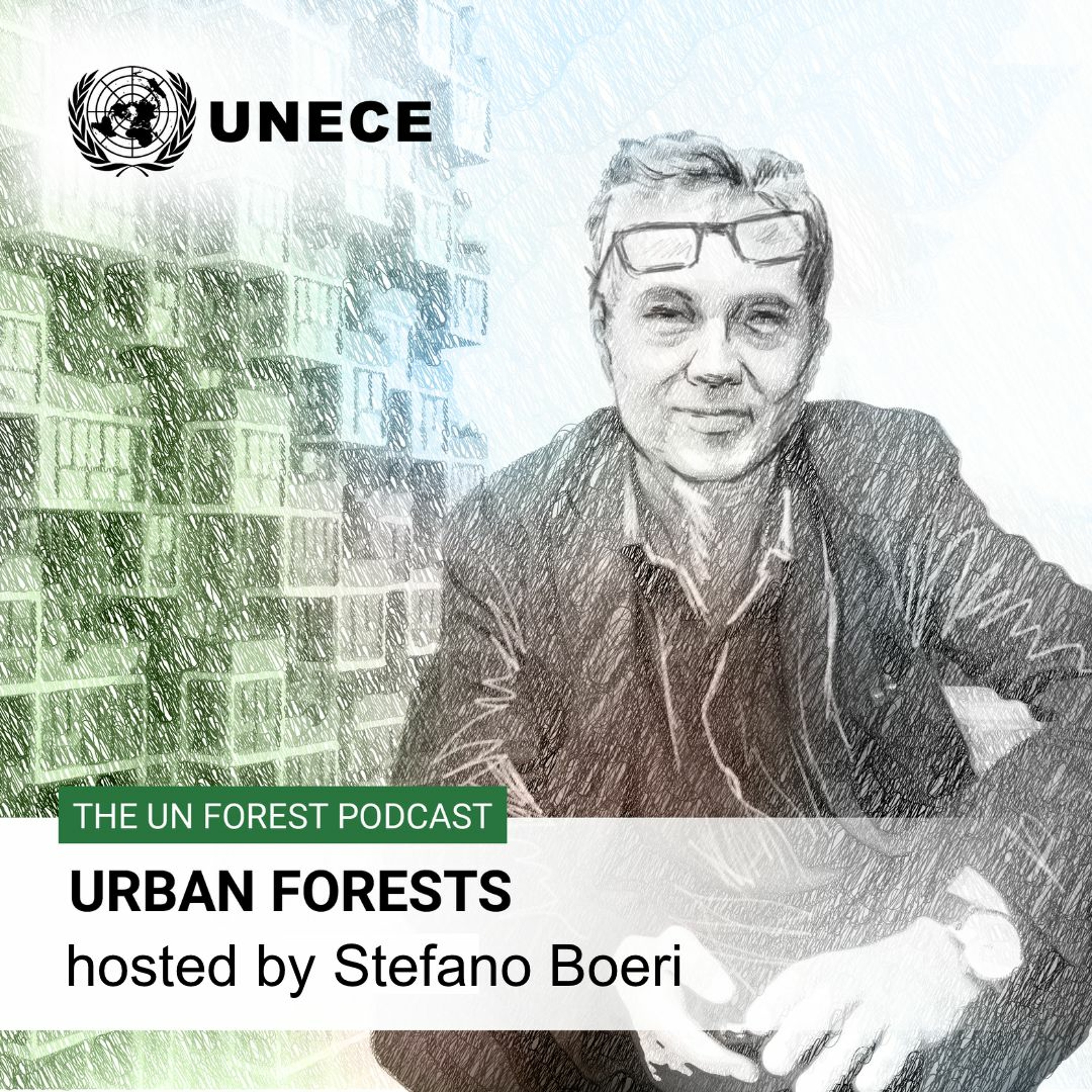
UNECEUrban forests hosted by Stefano Boeri - The UN Forest PodcastAs cities and communities around the world scale up efforts to cut emissions and prevent dangerous climate change impacts, one area that is often overlooked is trees and forests.
In this episode of The UN Forest Podcast, urban forester Prof. Cecil Konijnendijk joins Architect Stefano Boeri to help us understand why we need to bring nature back into our cities and how we can do so.
About the UN Forest Podcast:
We tend to take forests for granted, underestimating how indispensable they are for everyone on the planet.
Each episode of The UN Forest Podcast features special guests and speakers...
2023-05-0425 min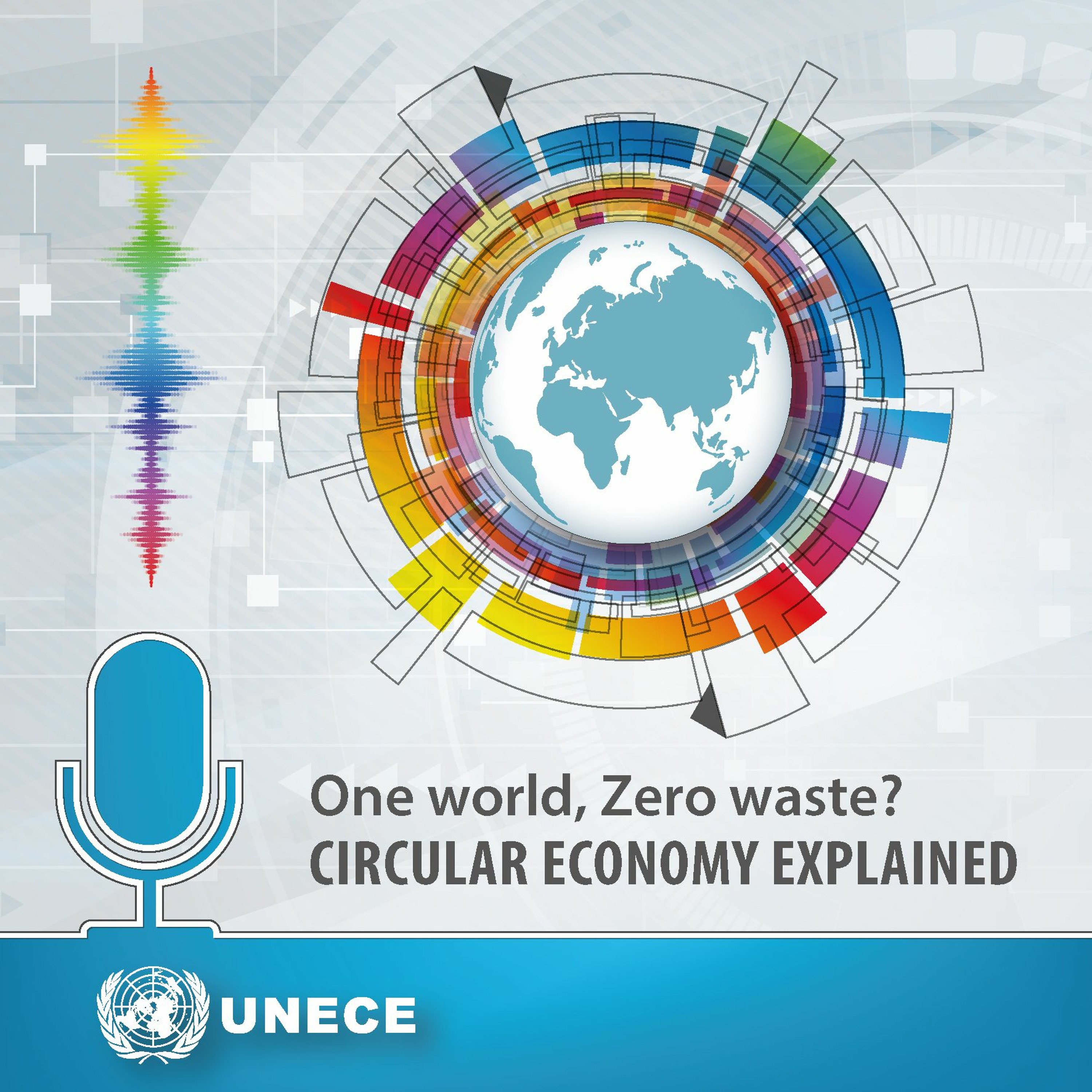
UNECECities - One World, Zero Waste? The Circular Economy ExplainedCities are primary centres of consumption of energy and materials, but at the same time offer an opportunity to manage resources efficiently and in innovative ways. As such, Cities can play a key role in driving the circular economy agenda forward, and many are doing just that.
In this episode of "One World Zero Waste? The Circular Economy Explained", we hear about the role of local governments in experimenting with circular economy approaches, with insights from Sofie Bracke, Deputy Mayor for Economy, Trade, and Port of the city of Ghent in Belgium. UNECE's Gulnara Roll also shares perspectives on cicularity...
2023-04-1230 min
UNECEInnovation Matters: Openness to creative destruction (part 1) - lessons from historyHow has our life improved though innovation? How has innovation occurred throughout history? How can policies be crafted to encourage innovative entrepreneurs to bring us more innovation? To guide us with these questions, Innovation Matters welcomes Professor Arthur Diamond to discuss his book "Openness to Creative Destruction: Sustaining Innovative Dynamism". In this podcast, which is the first of 3 episodes, he will start taking us through a narrative of human progress through creative destruction, or innovative dynamism, and its benefits. He demonstrates how such dynamism is far from inevitable, and the factors that, then and now, hold back its potential.
Arthur...
2023-02-2442 min
UNECEInnovation Matters: Transformative innovation & entrepreneurship for sustainable developmentOver the past decades, countries in the Pan-European region and North America have made significant efforts towards strengthening sustainable growth. However, the region is not on track to reach the Sustainable Development Goals (SDGs)by 2030.
Innovation is therefore needed to accelerate progress, helping to find solutions to ensure people's wellbeing while managing finite resources and preserving the environment. As a result, there is growing momentum around concepts such as mission orientation, directionality, and the entrepreneurial state - all intended to support a sustainable transformation of our societies.
To better understand the nature of transformative innovation and its importance for sustainable...
2023-02-0231 min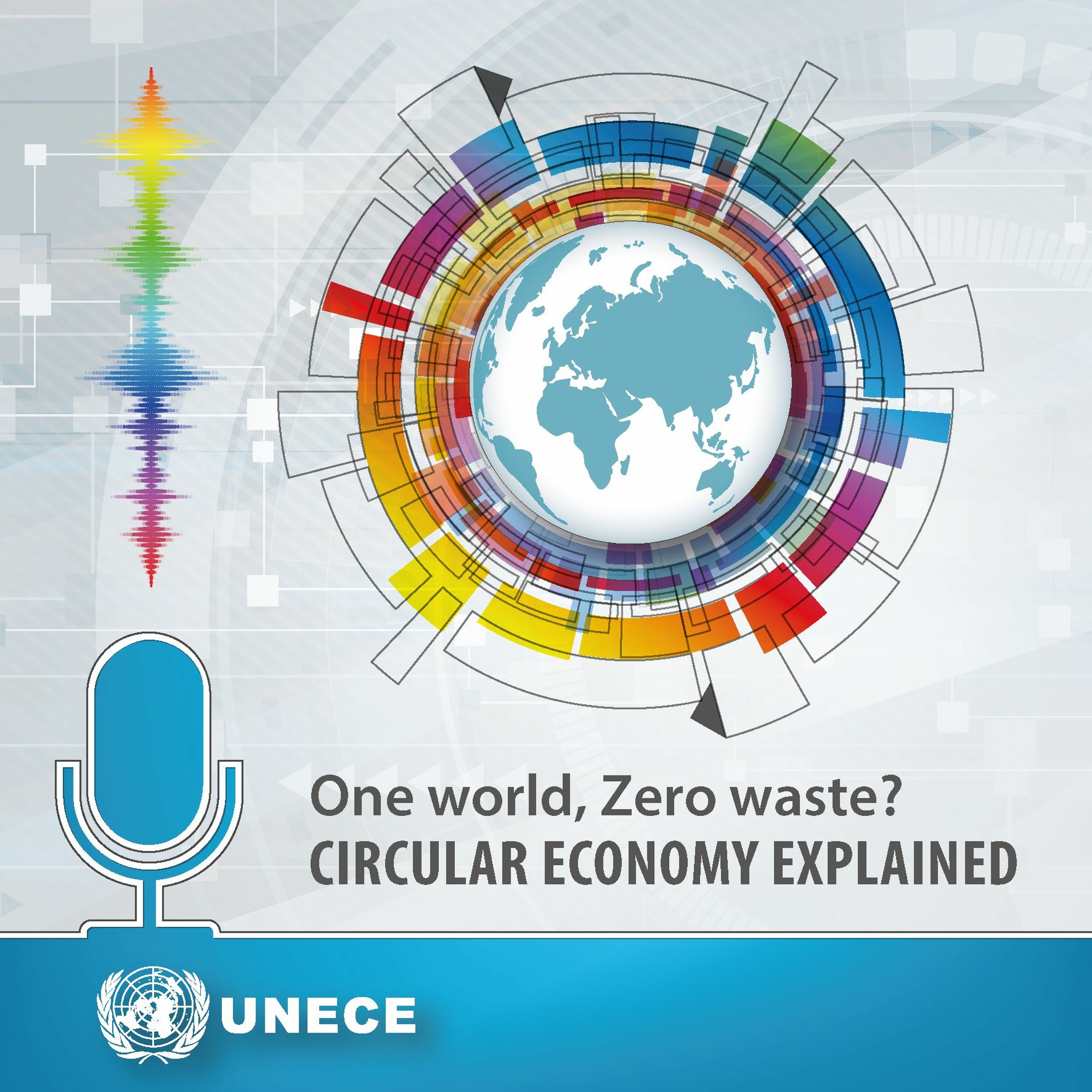
UNECEFashion - One World, Zero Waste? The Circular Economy ExplainedTextiles and clothing is an $1.3 trillion industry with more than 300 million employees across the value chain. It is an industry with huge environmental and social impacts.
Today less than 1% of material used to produce clothing is currently recycled into new clothing, representing a loss of more than $100 billion worth of materials each year, according to the Ellen MacArthur Foundation.
In 'One World, Zero Waste? The Circular Economy Explained', we explore opportunities and challenges to shift to more sustainable and circular approaches in how we produce and consume clothing with model, actor, author and activist Lily Cole, and Katia Vladimirova of...
2022-12-2242 min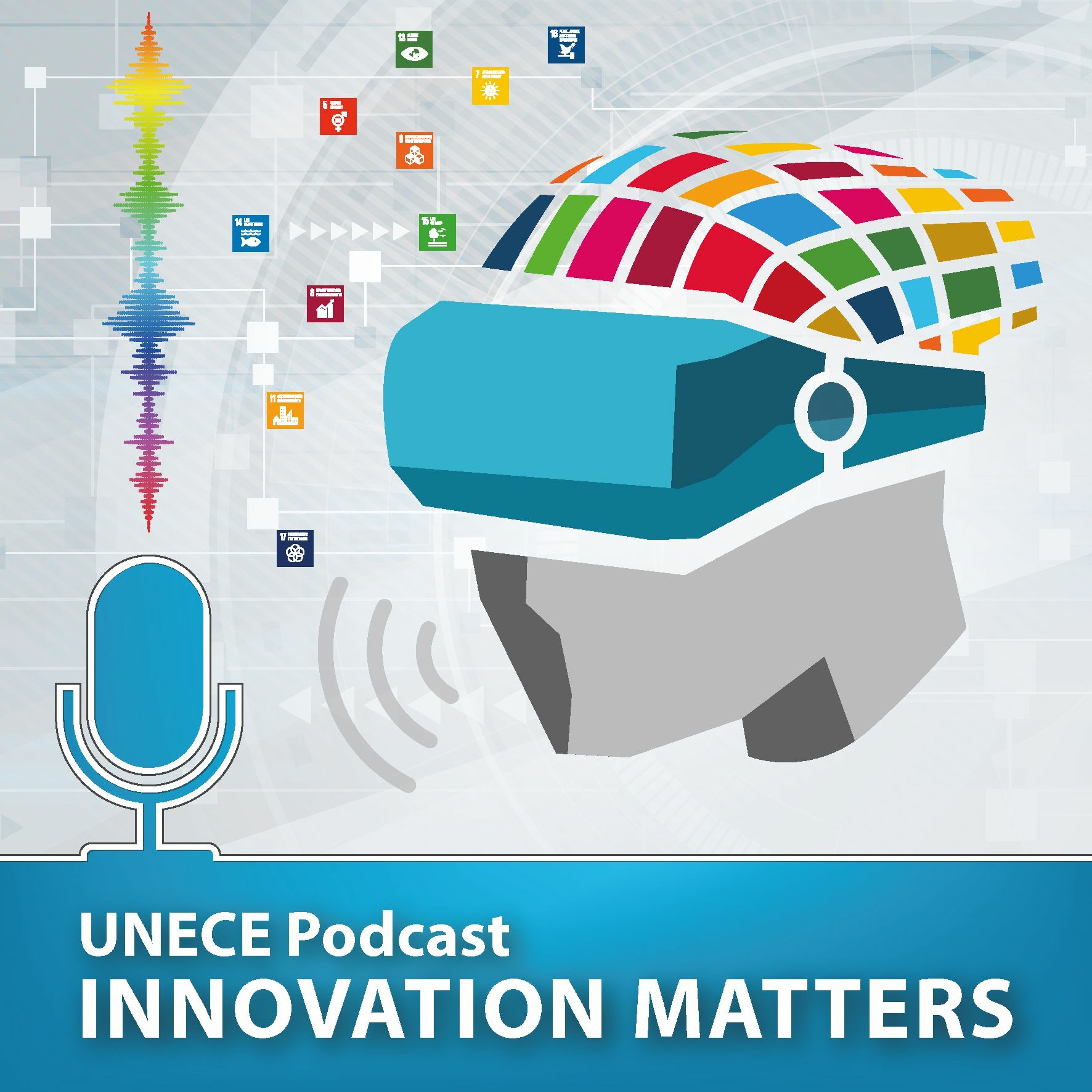
UNECEInnovation Matters: Cities as test-beds of innovation for sustainabilityWhen it comes to innovation development, the opinion often gravitates towards a macro-level government-focused perspective. Yet, as we discuss in the next episode of the Innovation Matters podcast, innovation does not only come from the national institutions but also from regional governments and even city-level programmes. It is cities that overwhelmingly provide the elements, systems, and dynamism driving innovation. They serve as test-beds, or laboratories, for trying out ideas for entrepreneurship, policies, and partnerships to see what works and what does not. Yet, in the words of today’s guest, “cities are places where the problems are really visible” and where...
2022-12-1438 min
UNECEInnovation Matters: The Innovation CommonsIn this episode of Innovation Matters, we explore the concept of the commons as applied to innovation and knowledge rather than, in the way we are familiar with the term, to natural resources and land.
Our Guest, Dr. Jason Potts, Distinguished Professor of Economics at RMIT University in Australia and Co-director of the Blockchain Innovation Hub, argues that what holds back innovation is access to relevant information, and that the innovation commons, a system able to share and enable cooperation around inputs, ideas, and opportunities, should be nurtured to overcome such obstacles.
2022-11-0254 min
UNECEFood - One World, Zero Waste? The Circular Economy ExplainedCurrently a third of all food produced is lost or wasted - around 14% between harvest and retail, and another 17% at household, food service and retail levels.
This means that the resources used to produce it - water, land, energy resources, and labour – go wasted. Food loss and waste also account for 8-10% of global greenhouse gas emissions. According to FAO estimates, the food that is lost and wasted could feed 1.26 billion hungry people every year.
In a world with finite resources yet a rapidly growing population, enhancing the efficiency and sustainability of agriculture, and making the best use of the resource...
2022-10-2636 min
Word to the W.I.S.E. #whystandardsmatterUnveiling UL Standards & Engagement's Gender Action Plan - Sonya Bird in Conversation with Mark RamlochanYou can read the full transcript of the conversation between Sonya Bird and Mark Ramlochan here:Sonya Bird: Thank you so much. I'm so excited to be here today with such an esteemed person in the field of diversity. Mark, how are you doing?Mark Ramlochan: I'm doing, I'm doing well. Sonya. I'm so happy to be here. Thanks for having this conversation. Sonya Bird: I am too. And it's so exciting. What we're talking about today is of course, gender diversity and gender responsive standards. And as you know, Mark, the UNECE...
2022-10-1121 min
UNECEInnovation Matters: Regional & local innovation hubs to accelerate sustainability shiftsGlobally, experts observe drastically different patterns of innovation-driven growth. Unsurprisingly, such diversity of outcomes can be largely attributed to the differences in national innovation systems. Even in the era of globalisation, national policies continue shaping development paths, experimentation opportunities, and transformative capacity of enterprises. Yet formulating effective national (and regional) innovation policies is not an easy task and requires complex considerations. From local-based preconditions to regional specificities, policymakers have a lot of factors to balance.
In this episode of UNECE’s Innovation Matters podcast, we welcome Prof. Cristina Chaminade, the Director of the Master’s program in Innovation and Global Sust...
2022-10-0540 min
UNECEEnergy - One World, Zero Waste? The Circular Economy ExplainedWhile the use of fossil fuels is inherently linear, renewable energy solutions, such as solar and wind, provide an immense opportunity for transitioning to a circular economy.
As countries strive to decarbonize their economies – with many adopting targets to achieve net-zero carbon emissions by mid-century - and meet commitments under the Paris Agreement, among the main approaches adopted is the scaling up of renewable energy in electricity production through targeted policy support schemes.
According to the International Energy Agency (IEA), renewable energy technologies like solar and wind are fundamental to reducing emissions in the electricity sector, which is today the si...
2022-09-1228 min
UNECEInnovation Matters: Holistic Innovation Policy and the Governance of National Innovation SystemsAs the economist Paul Krugman once said, “productivity is not everything, but in the long run, it is almost everything”. Productivity is among the most important sources of social and economic welfare, but innovation is also the most important source of productivity growth. The difficulty with the innovation processes is that they are evolutionary; we do not know exactly where they are going, and we cannot predict them.
To understand how innovation works, the Systems of Innovation approach has emerged – a perspective with strong roots in the Schumpeterian and Austrian schools of economics. Putting this approach into practice, however, has been d...
2022-08-0933 min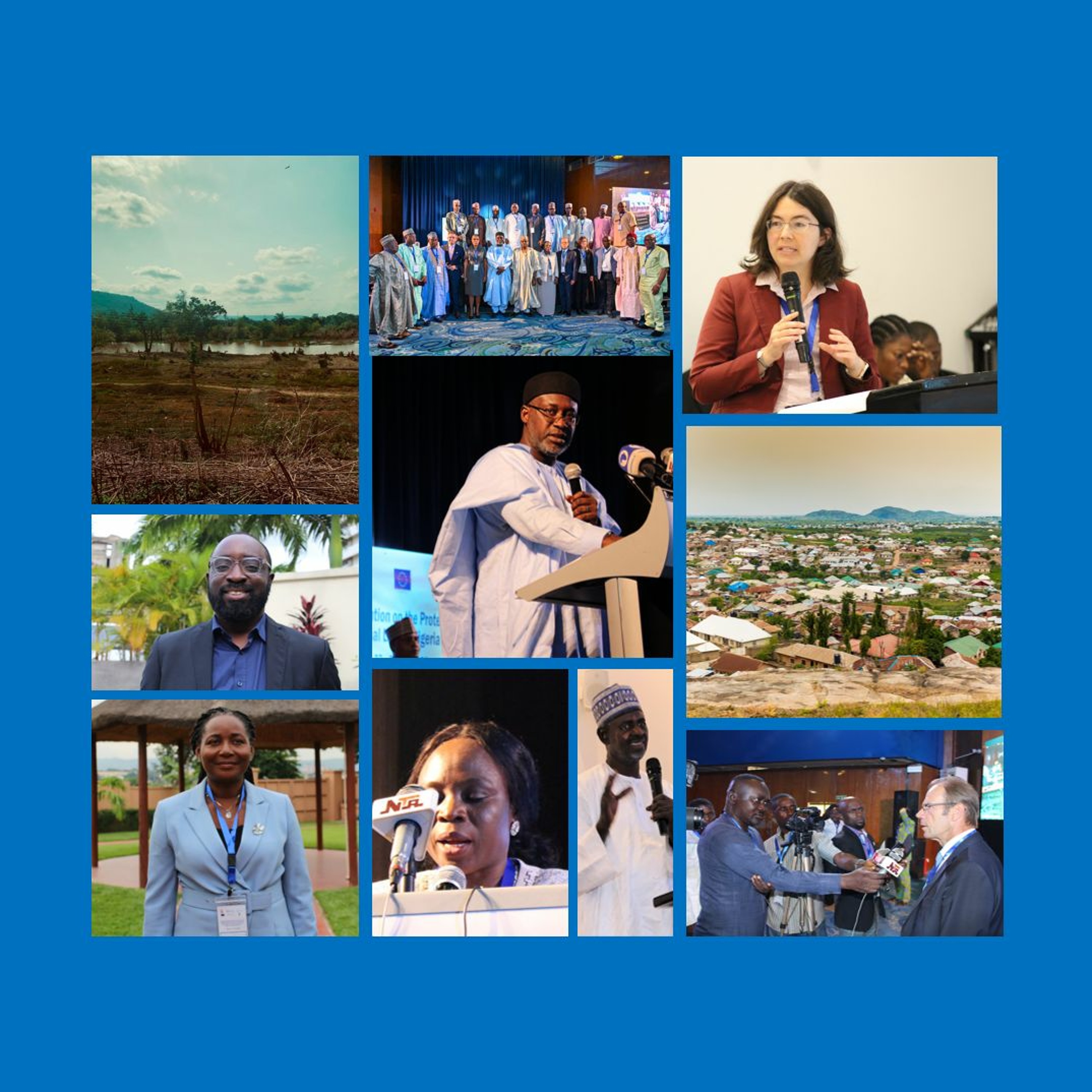
UNECEWhy cooperation on shared water matters: insights from NigeriaNigeria’s planned accession to the UN Water Convention could be a tipping point for cross-border water cooperation, contributing to security, climate change adaptation and sustainable development in the Lake Chad and Niger basins.
Find out why with these expert insights from Abuja, and learn more at https://unece.org/media/press/369572
2022-08-0515 min
UNECEInnovation Matters: The Rise of the Global Digital Economy & Lessons from East AsiaEvery day, billions of people connect with others, purchase services from businesses – all within a click of a button from their electronic devices. These new, rapidly unfolding processes and forms of content, distributed in a variety of digital formats, offer salient opportunities and scope for innovation. What is the government’s role in supporting the evolution and promotion of the digital economy?
In this episode of "Innovation Matters", Professor Carin Holroyd and Professor Ken Coates, both from the University of Saskatchewan, explore the nature, implications, potential and risks of government policy on the digital economy. According to their publication "The Glob...
2022-07-0543 min
UNECEInnovation Matters: The Innovation Paradox - Innovation in Transition EconomiesGiven that the potential returns of innovation in developing and catch-up economies is large, why there is so little investment into innovation? This “innovation paradox” is at the centre of this episode. Despite the enormous potential that innovation, especially gradual innovation building on ideas and technologies that have proven their mettle elsewhere, and despite, in many countries, strong political commitment, UNECE transition economies struggle to innovate in ways that drive productivity growth and sustainable development.
Why do good ideas not necessarily translate into innovation, and what can developing countries do about it? We decided to ask this and many other ques...
2022-06-2237 min
Sustainable Living PodcastS3, Ep. 6: Independența Energetică: Provocări și Oportunități, Andrei Covatariu, Energy Expert, UN Economic Commission for Europe (UNECE)Andrei Covatariu este expert internațional în energie și schimbări climatice. Activitatea sa se concentrează pe politicile climatice și energetice, concentrându-se pe procesul de tranziție energetică și provocările geopolitice, economice și sociale ale acestuia. Opiniile și analizele de politică ale lui Andrei sunt publicate și citate în mod constant în mass-media internaționale.
Andrei este în prezent expert în Task Force pentru „Digitalizarea în energie”, la Comisia Economică pentru Europa a Națiunilor Unite (UNECE). Totodată, Andrei este bursier nerezident în Programul Climate and Water, la Institutul Orientului Mijlociu (Statele Unite), și Senior Research Associate la Energy P...
2022-06-2130 min
UNECEMobility - One World, Zero Waste? The Circular Economy ExplainedThe environmental footprint of transport is subject to much attention, given its impact on health, the environment, climate change, and the extraction of natural resources. Could a circular economy approach help address these challenges?
In the circular economy, it’s the whole process of manufacturing, using, and then what happens to the materials afterwards that needs to be considered. In One World Zero Waste? The Circular Economy Explained, we explore with guests Maya Ben Dror from the World Economic Forum and Duncan Kay, Vice chair of the Group of Rapporteurs on Pollution and Energy of the World Forum for Harmonization of...
2022-06-2126 min
UNECEMeasurement - One World, Zero Waste? the Circular Economy ExplainedThe shift to a more resource-efficient and circular economy can create jobs and business opportunities, improve wellbeing, and protect the environment at the same time. But with the world’s economy only 8.6% circular according to the Circularity Gap Report 2022, what's holding us back?
In “One World Zero Waste? The Circular Economy Explained”, we explore with Dr. Kees Baldé, Senior Scientific Specialist at the Sustainable Cycles Programme at the United Nations Institute for Training and Research, why the societal and environmental benefits of a circular economy can only be reached through the proper policy environment with clear objectives, regulations, incentives and measure...
2022-06-1526 min
UNECEInnovation Matters: Post-Socialist Transition 30 Years onUNECE podcast Innovation Matters releases its second episode on “Post-Socialist Transition 30 Years on: the Importance of Furthering Broad Innovation to Progress Towards Agenda 2030”.
30 years later, since the fall of the Soviet Union, UNECE countries have varied success in reaching the increasingly market economy, bringing interesting findings of how economic development for sustainable development, and innovation policy, in particular, is dependent upon the foundation and the ongoing transition process. The guest for this episode is Dr. Aleksandr V. Gevorkyan from St. John’s University in New York. Based on his book “Economic transformation, development and society in Eastern Europe and the former S...
2022-06-0731 min
Making a house a homeTaming mortgage markets can make homes more affordableCheap money is gold for private housing investors, and central banks have a big role to play in directing money flows. This is one of the key messages from our previous podcast episode that focused on how central banks are affecting our access to decent, affordable housing. Of course, we know that many more players are involved and responsible for the housing situation we observe in different locations.
Today, we will be getting closer to the action and zeroing in on the role of mortgage banks and how these financial institutions are regulated in a way that i...
2022-05-3038 min
UNECEInnovation Matters: The Platform Economy - Revolutionizing how we produce, consume and interact?Could the use of the "platform economy" to enable sharing, renting, and digitizing – rather than owning – a wide range of physical assets support progress towards the circular economy and sustainable development?
Digital platforms can aggregate supply and demand, instill trust, and guarantee transactions. These platforms can open convenient options to access what we need when we need it - from power drills to cars. As the guest in the first episode of the "Innovation Matters" podcast, Professor Michael Munger of Duke University, points out, we may be witnessing the beginning of a development that will fundamentally transform how we consume, prod...
2022-05-2337 min
Making a house a homeIn search of tools that tame financialisationWhere did we leave the conversation last time? After our 12 #Housing2030 podcast episodes about affordable housing that is mindful of climate sustainability, responsible land policy, better governance and finance were listened about 2,400 times, we launched the long-awaited “#Housing2030: Effective policies for affordable housing in the UNECE region”. The study that was led by Housing Europe, UNECE, and UN-Habitat draws on the experience of over 100 researchers, policymakers and housing providers from across the UNECE region and beyond, to define useful approaches, outline their advantages and disadvantages, and illustrate how smart affordable housing solutions can be applied locally.
A comp...
2022-03-2432 min
UNECEForests - One World, Zero Waste? The Circular Economy ExplainedThe idea of a ‘circular economy’ is increasingly being embraced by political leaders, businesses, and citizens. But what does it mean in practice? In "One World, Zero Waste? The Circular Economy Explained", we explore some of the key challenges and opportunities across sectors - from energy to transport to clothing, food and beyond.
In episode 1, host Nicki Chadwick asks Lotta Lyrå, CEO of Södra, Sweden's largest forest owners association and an international forest industry group, about how forests can support the circular economy.
2022-03-2129 min
The Hydrogen Bar#84: The Hydrogen Bar sponsored by TÜV SÜD - with Thomas FrohnInsights into the EU type approval of hydrogen-powered vehicles after the (EC) 79/2009 repeal
A "true classic" of hydrogen vehicle approval in the EU, Regulation EC79-2009, will be repealed this summer. Together with Thomas Frohn, hydrogen expert at TÜV SÜD's mobility division, we discuss the resulting new regulatory framework for hydrogen-powered vehicles.
Hosts: Martin Sekura and Johannes Roessner
Guest: Thomas Frohn
Contact: kontakt@hydrogenbar.de
TÜV SÜD whitepaper on EC79-2009 repeal: https://www.tuvsud.com/en/resource-centre/white-papers/eu-type-approval-of-hydrogen-powered-vehicles
New EU regulation 2012/535/EU: https://eur-lex.euro...
2022-03-0925 min
Carnegie Council PodcastsC2GTalk: How is the UN Economic Commission for Europe (UNECE) working with countries to attain Carbon Neutrality in the ECE region? with Olga AlgayerovaMany countries in the ECE region are embracing carbon neutrality recognized as the first milestone towards sustainable energy, with leaders like Canada, Denmark, France, and the United Kingdom, says Olga Algayerova during a C2GTalk interview. She calls for countries to recommit to the future: "We are really running out of time and urgent action is needed." She highlights that UNECE provides a platform for technology-neutral dialogue and are keen to work with C2G to help countries get better informed about new emerging technologies that could play an important role in fighting climate change in the future. ...
2021-11-0835 min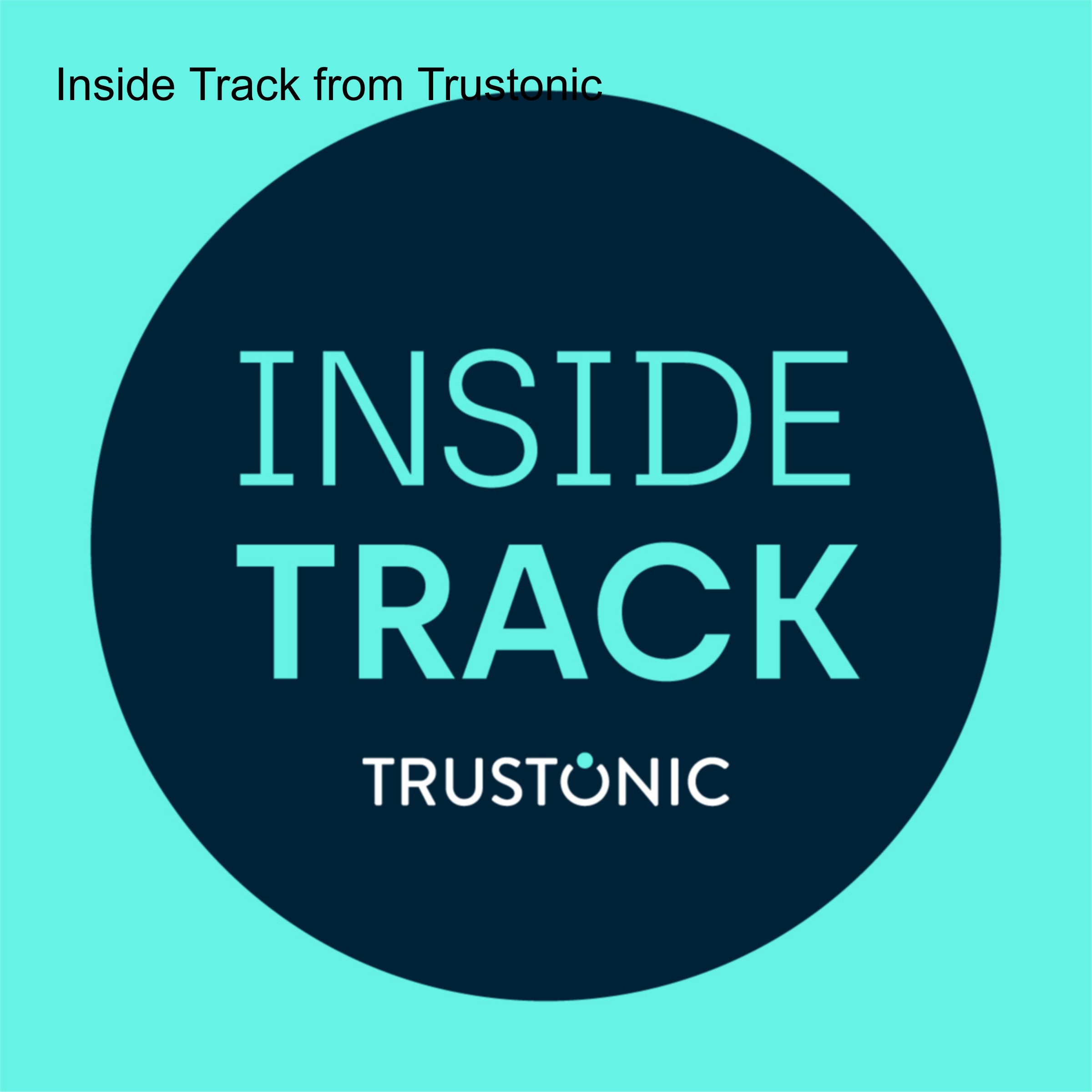
Inside Track from TrustonicS2E2 | How connected vehicles will be defined with the UNECE WP.29 regulation and ISO 21434
In this Inside Track episode, Andrew Till, Trustonic’s General Manager of Automotive and Jasmina Omic, Product Manager Services at Riscure dive into why there’s a need for cybersecurity solutions for the automotive industry.
They discuss the upcoming UNECE WP.29 regulation and ISO 21434 and the challenges the automotive industry faces for the first time.
We work with automotive companies across the globe to bring innovative solutions to the connected car industry with our trusted Secure Platform.
2021-07-2248 min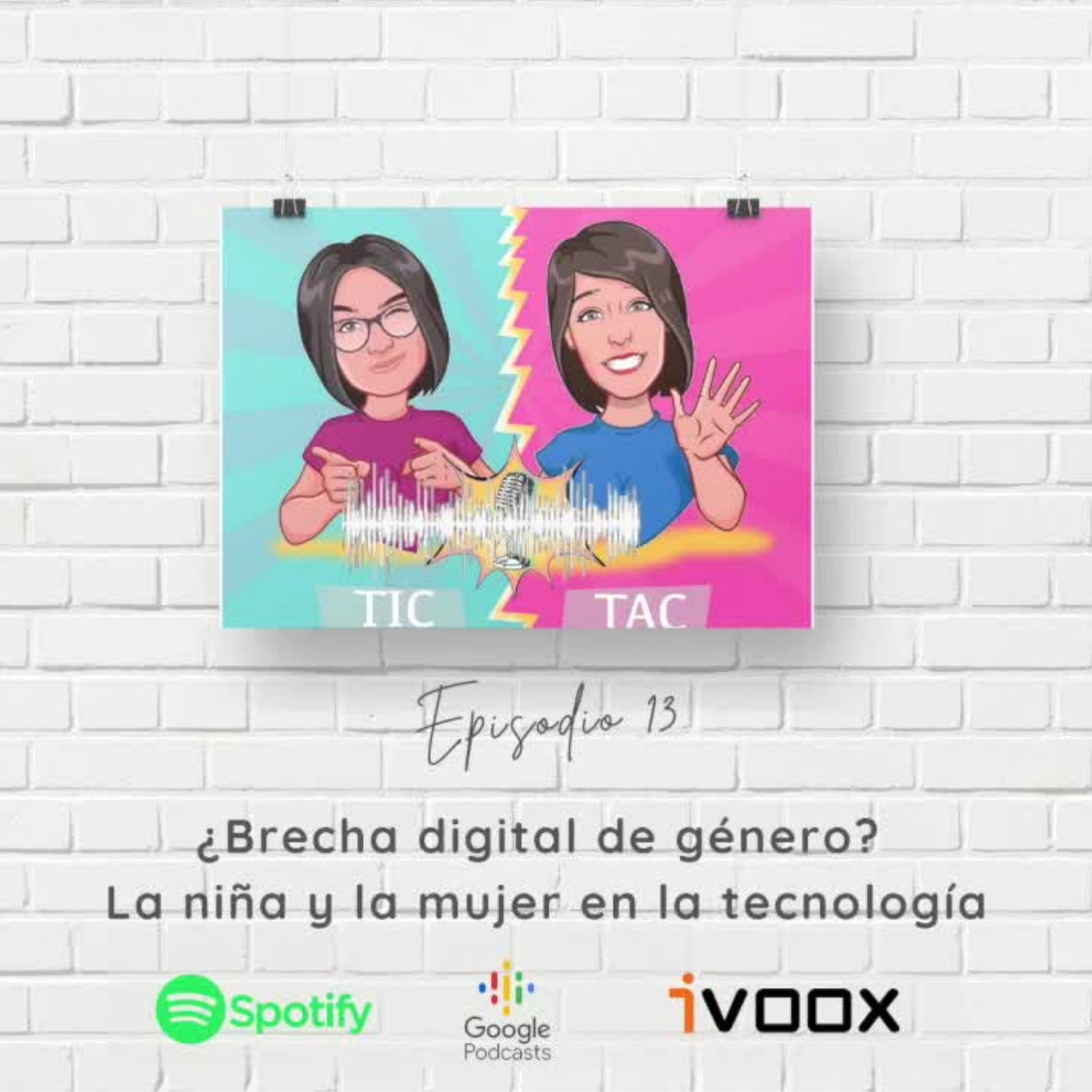
Duelo TIC TACEpisodio #13: ¿Brecha digital de género? La niña y la mujer en la tecnología¿Sabías que el 22 de abril se celebra el Día Internacional de las niñas en las TIC? En este episodio trataremos el concepto de brecha digital de género con una serie de propuestas para el aula. Acompáñanos a conocer a diferentes Figuras Ocultas del mundo de las TIC; mujeres que han hecho historia porque se han arriesgado. Con este episodio queremos que tú, profesora, juegues y explores con la tecnología. ¿Te unes al duelo para celebrar esta efeméride?
ARTÍCULOS MENCIONADOS:
Instituto Andaluz de la Mujer “Campaña Día Internacional de las niñas en las TIC” Ha...
2021-05-2323 min
DUELO TIC TACEpisodio #13: ¿Brecha digital de género? La niña y la mujer en la tecnología¿Sabías que el 22 de abril se celebra el Día Internacional de las niñas en las TIC? En este episodio trataremos el concepto de brecha digital de género con una serie de propuestas para el aula. Acompáñanos a conocer a diferentes Figuras Ocultas del mundo de las TIC; mujeres que han hecho historia porque se han arriesgado. Con este episodio queremos que tú, profesora, juegues y explores con la tecnología. ¿Te unes al duelo para celebrar esta efeméride?
ARTÍCULOS MENCIONADOS:
Instituto Andaluz de la Mujer “Campaña Día Internacional de...
2021-05-2323 min
Making a house a homeDiverse funding ensures housing affordability when public finances 'get a cold'Being a fundamental right, our homes should be treated the same way in national accounts as energy or transport infrastructure. While we often think of the social benefits of housing affordability, there are also a handful of economic reasons to reform or improve housing finance.
Building more social housing, for example, counterbalances house price inflation. Grants, loans, adapted interest rates that support the construction or renovation of homes might appear as costly solutions, but solid evidence shows that it is still a much better option for governments than subsidising rents or mortgages for private housing in the...
2021-04-0722 min
Speakeasy SecurityThinking of hacking a connected car? Think again.How likely is it for a cybercriminal to hack your vehicle? Why is the UN involved and what are car manufacturers doing to help protect connected vehicles? This week on Speakeasy Security, Tony and Ranson take a look at how connected cars can be attacked and what the industry is doing to help. If you’re a gear head, a connected car owner, or simply interested in learning more, you won’t want to miss this episode of Speakeasy security.Links:The Department of Transportation Cybersecurity – Cybersecurity Best practices for connected vehicles: https://www.nhtsa.gov/pr...
2021-04-0129 min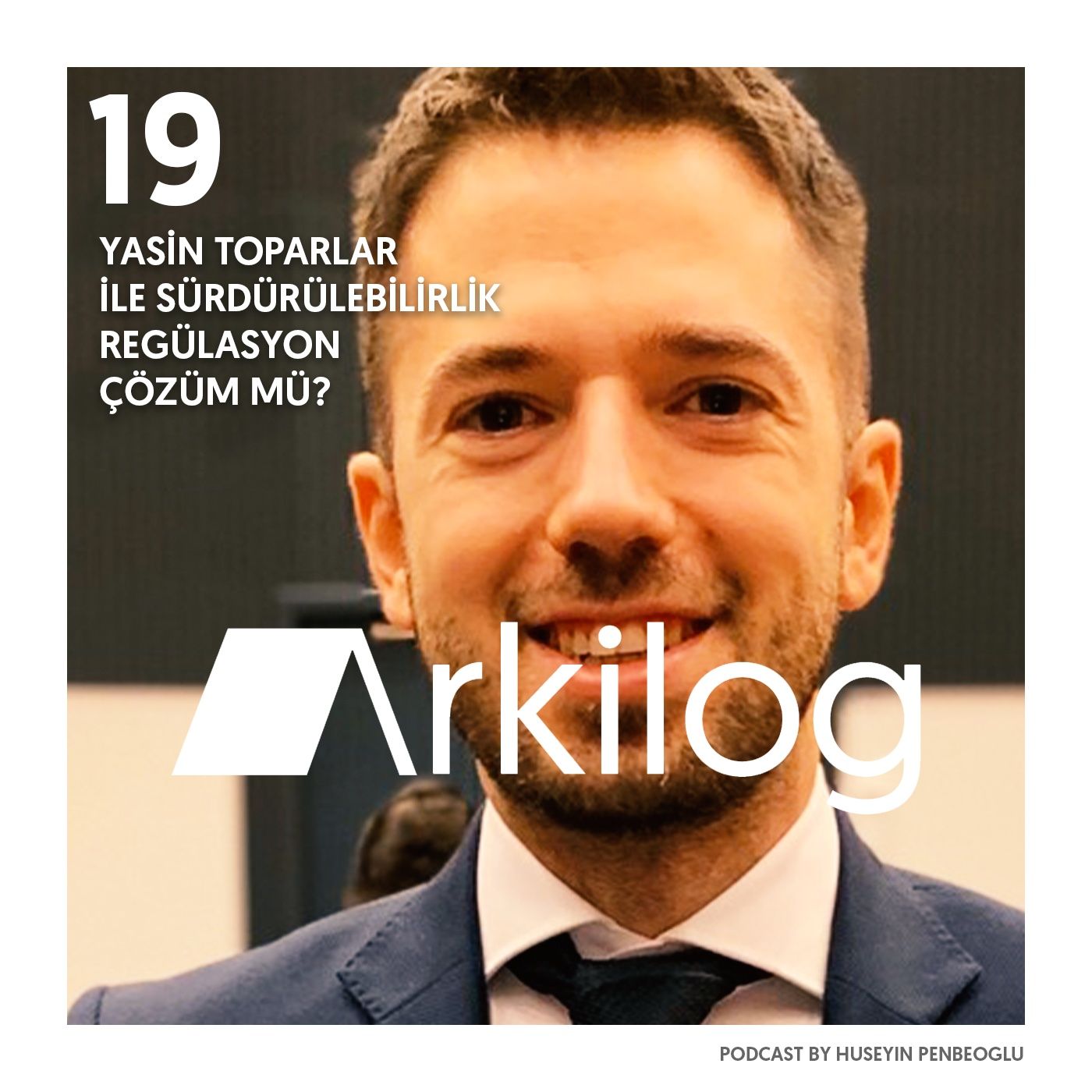
Arkilog#19 diaLOG - Yasin Toparlar ile Sürdürülebilirlik - Regülasyon çözüm mü?Eski ortağım, eski mühendis, yeni veri uzmanı ama daima sürdürülebilirlik odaklı daima araştırmacı kişi Yasin Toparlar ile keyifli bir sohbet kaydettik. Regülasyonlara değindik, şirketin kapanmasına dair öz eleştiri yaptık, mimarların yüzeysel yeşil anlayışına dokundurduk. Keyifli dinlemeler, yorumlarınızı bekliyorum.Programda bahsedilen konular ve Arkilog'a dokunma/ulaşma yöntemleri ise sırasıyla şu şekilde:****1. Jevons Paradox: https://en.wikipedia.org/wiki/Jevons_paradox2. Nachhaltigkeit: Surdurulebilirlik kelimesinin Almancasi https://de.wikipedia.org/wiki/Nachhaltigkeit / https://www.econstor.eu/bitstream/10419/50...
2021-03-231h 01
Beginner's Mind#37: Ana Trbovich - Peer-to-Peer Energy TradingIn this podcast episode, we will discuss how blockchain technology is utilized in the energy sector beyond the well-known utility of a payments system, her experiences in entrepreneurship and innovation, including start-up life in Berlin.Ana Trbovich is the Grid Singularity co-founder & COO and Vice-Chair of the Energy Web Foundation. She serves on UNECE Carbon Neutrality and DENA SET Hub Advisory Boards, and previously acted as an independent board member at the European Institute for Innovation and Technology (EIT), Axa, and the Belgrade Philharmonic, among others. She teaches Entrepreneurship at FEFA, a leading business school in Belgrade...
2021-03-071h 09
Making a house a homeHow to take the Finnish track in housing policy?When speaking about social inclusion and housing, one European country can be seen as a total myth buster. Yes, it is Finland. Once travel is safe and possible again, we dare you to have a stroll in its capital, Helsinki and try to tell the difference between the tenures just by looking at the buildings. It is also the right time to say that the next edition of the International Social Housing Festival in June 2022 will give you this opportunity.
A European champion in tackling homelessness, Finland has been implementing sensible land policies and for half a...
2021-02-1912 min
Making a house a homeEvidence - the compass of a good housing governance“Take nothing on its looks; take everything on evidence. There's no better rule,” writes Charles Dickens in his novel the ‘Great expectations’. When speaking about evidence, the hundreds of graphs and reports about the current state of housing and well-being are crystal clear - prices and incomes rarely march shoulder to shoulder. But is housing legislation always based on facts? Positive examples of housing affordability do exist, and yet, serious improvements in this direction are more than necessary.
Welcome to ‘Making a house a home’ - the podcast of Housing Europe, the European federation of public, cooperative and social ho...
2021-02-1524 min
Resources RadioAssessing the Promise and Peril of Wood Pellet Products, with Francisco X. AguilarIn this episode, host Daniel Raimi talks with Francisco X. Aguilar, a professor at the Swedish University of Agricultural Sciences and leader of the Team of Specialists on Wood Energy of the United Nations Economic Commission for Europe. Aguilar and coauthors recently published a study on the environmental effects of the rapid growth of the wood pellet industry. Because wood pellets are viewed as carbon neutral, the boom in wood pellets may help meet climate targets in Europe. This conversation focuses on how the wood pellet industry’s growth has affected the number of trees and carbon stocks in the so...
2021-02-1333 min
Making a house a homeThe fundamental 'building blocks' of good housing governanceWhen was the last time when you took a stroll around a neighbourhood and you found it well-maintained, with a good social mix and green spaces or just the opposite, rather run-down, leaving you a feeling that things can be improved? And a second question to kick off the discussion - when was the last time when you thought that districts, homes and people’s quality of life are the result of a strategic, systematic political action or perhaps inaction?
Welcome to ‘Making a house a home’ - the podcast of Housing Europe, the European federation of public...
2021-02-0117 min
Making a house a homeThe ‘cocktail of change’ improving the cities we live inWe can’t judge a book by its cover but can we have a clear idea of the vision of a city by looking at how liveable it is? Paying special attention to the level of existing affordable housing, the configuration of its neighbourhoods, the ecological footprint of homes and people’s access to green spaces, could be a hint helping us to define how functional megapolises, cities, small towns and rural areas are.
Welcome to the podcast of Housing Europe, the European federation of public, cooperative and social housing providers. This is the 6th episode dedicated to t...
2020-11-0326 min
Making a house a homeBringing tenants on board - an ingredient for a successful renovationOur home – the place where we now work and play, celebrate holidays and relax might seem to us to be always the same, just as we left it this morning. At the same time, we also know that housing is developing as we are speaking. Isn’t that a fascinating paradox? Housing renovation is now on nearly all political agendas, seen as a way to achieve climate goals, improve people’s lives and boost the economy. Innovative solutions and models are coming from different corners of Europe. We see the advancement, but we also see the global health pandemic as a c...
2020-10-2815 min
Making a house a homeHomes good for the climate and for the pocket - it is possibleThe changing climate of the planet presents a challenge to all of us. Besides being a key issue that we need to tackle swiftly and effectively, climate change and environmental goals have to be designed to protect all parts of our society. With the need to heat, cool and build our homes more sustainably, housing goes right at the heart of the climate discussion.
Our subscribers who have been closely following this show will notice that there is a change of the voice behind the microphone, the voice of my predecessor Michalis Goudis who kicked-off this show...
2020-10-2614 min
Public International Law Part IIIThe International Law of Mega-AwardsPublic international law’s turn to judicialisation in the last three decades has led to more attention paid to remedies including of monetary character, in inter-State dispute settlement as well as in tribunals open to non-State actors. In the last five years or so, a more discreet phenomenon of successful 1+ billion USD claims has emerged. I will address it under the rubric of ‘mega-awards’, in line with the terminology reportedly used by States in the UNCITRAL Working Group III meeting this October. A few recent examples from different international tribunals will illustrate my point. Last September, Albania allocated 1.2 billion EUR for ex...
2020-08-2543 min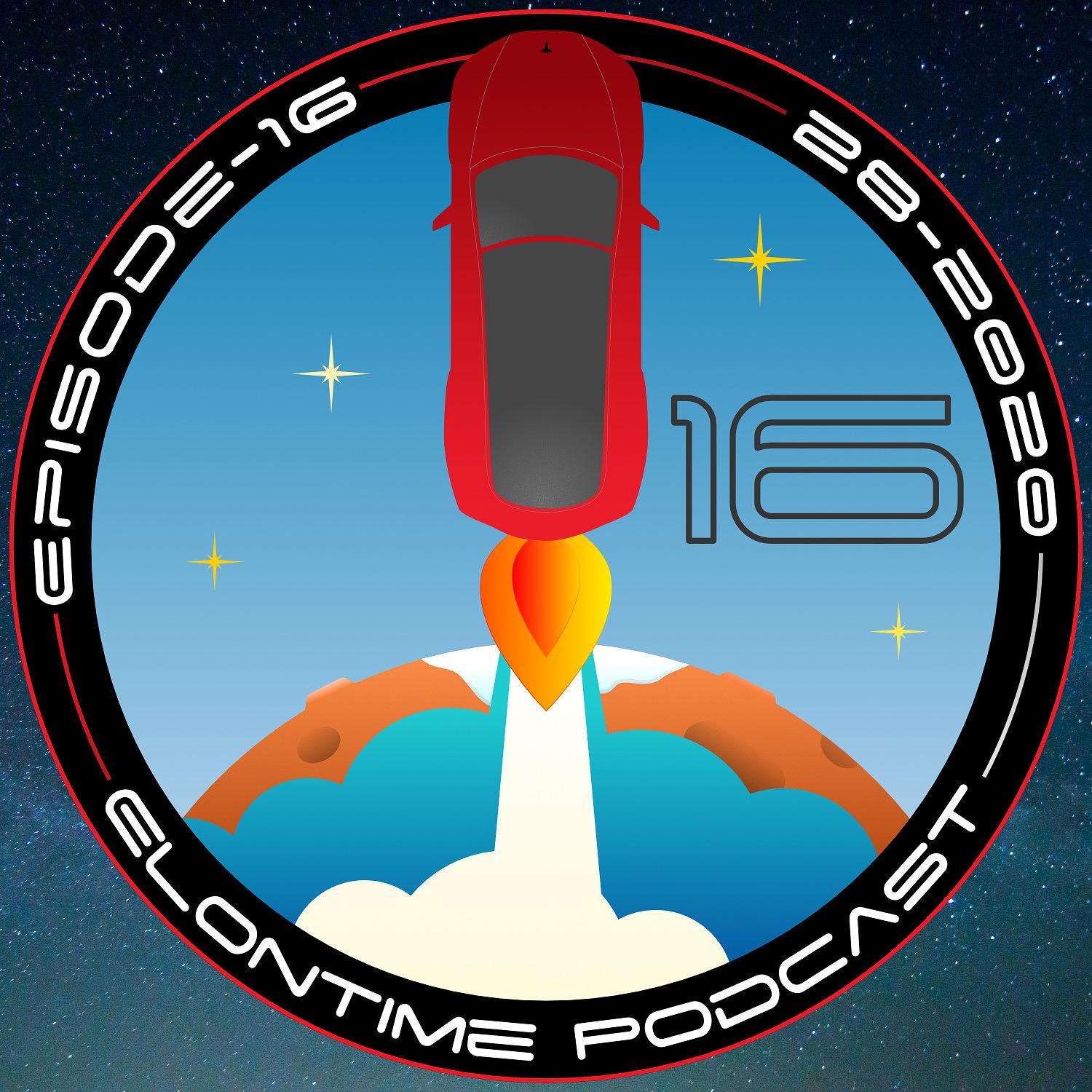
Elontime PodcastSpaceX und die Space Force, ein Hund für Boca Chica, Autonomes Fahren bei Tesla, Not-A-Boring Competition
Wir haben nach einer kurzen Pause eine Menge nachzuholen.
Der Elontime Podcast
In dieser Woche berichten wir in 18 Kapiteln über Interessantes aus den vergangenen zwei Wochen. Es geht um Satelliten von und mit SpaceX, den Mars 2020 Rover, die laufende Mars Insight Mission, einen Roboterhund für Boca Chica, die UN Konferenz zu autonomer Mobilität, Teslas Quartalszahlen, sowie Lebenszeichen von Neuralink und Boring-Company. Ihr hört den Elontime Podcast - Schön, dass ihr eingeschaltet habt!
SpaceX
Starlink 10 wurde verschoben (twitter.com)
Nächster Starlink 10 Startversuch (twitter.com)
Neue Copern...
2020-07-101h 03
Rotabu#Rotabu 8: TRC American Diner’ın Kurucuları Buse Dövenci ve Ali Dövenci Çifti İle Marka Olma Yolculukları Üzerine Eğlenceli ve Aşk Dolu Bir SohbetBu yolculukta biraz da keşfettiğim ve hayranı olduğum mekanların bu noktaya nasıl geldiklerini kurucularından dinleyelim, onların marka olma rotalarını öğrenelim istiyorum. Bu sebeple, TRC American Diner’ın kurucularını davet ettim. Amerikan lezzetlerini Türk mutfağına ait dokunuşlar ile harmanlayarak bizlerle tanıştıran ilk diner konseptli marka olan TRC American Diner’ın kurucuları aşçı Buse Dövenci ve şef Ali Dövenci ile sohbet ettik. Kişisel hayatlarından, marka yolculuklarına, karantinadan, yeme içme sektörünün geleceği hakkındaki öngörülerine kadar pek çok şey konuştuk! Ayrıca bize Beşiktaş’ta...
2020-06-1352 min
Making a house a homeParis: the housing strategy at the heart of a functional and socially mixed '15-minute' cityOne could call it the ‘holy grail’ of today’s highly urbanized world. The way authorities manage it shapes the way we live, including how much public and green space we can benefit from, how we can move around, what types of services we can find around us and most importantly what kind of home we can access. Urban Land is a cornerstone of modern cities and today’s focus point of ‘Making a house a home’. In the third episode of our mini series dedicated to the ‘Housing 2030’ joint international initiative of Housing Europe, UN Habitat and UNECE around housing afforda...
2020-05-1824 min
Making a house a homeIt all comes down to what piece of land you can affordParaphrasing Mark Twain one could say “take good care of Land, they aren't making it anymore”. This is why when one needs to look at ways to boost provision of affordable housing until 2030, land is definitely one of the major points for consideration. This is episode 2 of our mini-series dedicated to Housing 2030, the joint international initiative of housing experts from over 56 governments through UNECE and UN Habitat and 43,000 affordable housing providers and neighbourhood developers represented by Housing Europe. It aims to improve the capacity of national and local governments to formulate policies that improve housing affordability and sustainability.
As...
2020-05-1330 min
El Podcast de JF CaleroINNENGINE, DOCTOR X, WANKEL, ACTUALIDAD: Preguntas y Respuestas con JF Calero y Doctor X#motor #juanfranciscocalero #innengine
LINKS Y RECURSOS MENCIONADOS:
Info del ministerio sobre la gasolina E10
https://energia.gob.es/Gasolinas/Paginas/Preguntas-frecuentes.aspx
Por dónde nos llegarán los coches chinos
https://youtu.be/EbLosa-VfO0
Coche eléctrico por menos de 10.000 euros de china
https://youtu.be/QfcKK7Z6Rok
Comprar un usado
https://youtu.be/5xriaaz9MAE
Gasolina Premium o low cost
https://youtu.be/Aq_zQeZ2Pq0
Se acaba la gasolina 95
https://youtu.be/I1NqrFqiAPE
Estupidez coche a GLP
https://you...
2020-05-0752 min
Making a house a homeGood land policy involves planning for the wider public interestThis episode kicks off a mini-series dedicated to #Housing2030, a joint international initiative of housing experts from over 56 governments through UNECE and UN Habitat and 43,000 affordable housing providers and neighbourhood developers represented by Housing Europe with the aim to improve the capacity of national and local governments to formulate policies that improve housing affordability and sustainability.
As the countdown to the first virtual event of the ‘Housing 2030’ initiative, taking place on May 20th has started we’re looking at its central theme which is Land with the help of 3 excellent guests. For this first episode, I am thrill...
2020-05-0632 min
The Smart and Sustainable City podcastUNECE (part3): Smart Cities and the 2030 SDGsImproving Smartness and Sustainability of Cities towards realization of the 2030 Agenda for Sustainable Development in the UNECE region. Dr Agata Krause is an adviser in the United Nations Economic Commission for Europe (UNECE) in Geneva, Switzerland. She works on the development and implementation of housing and urban policies in the countries and cities of the UNECE region. The United Nations run a Smart City program called United for Smart & Sustainable cities. Within UNECE, Agate is responsible for the evaluation of smartness and sustainability of cities using the UNECE/ITU standard KPI for Smart and Sustainable Cities. In this interview we...
2020-04-2617 min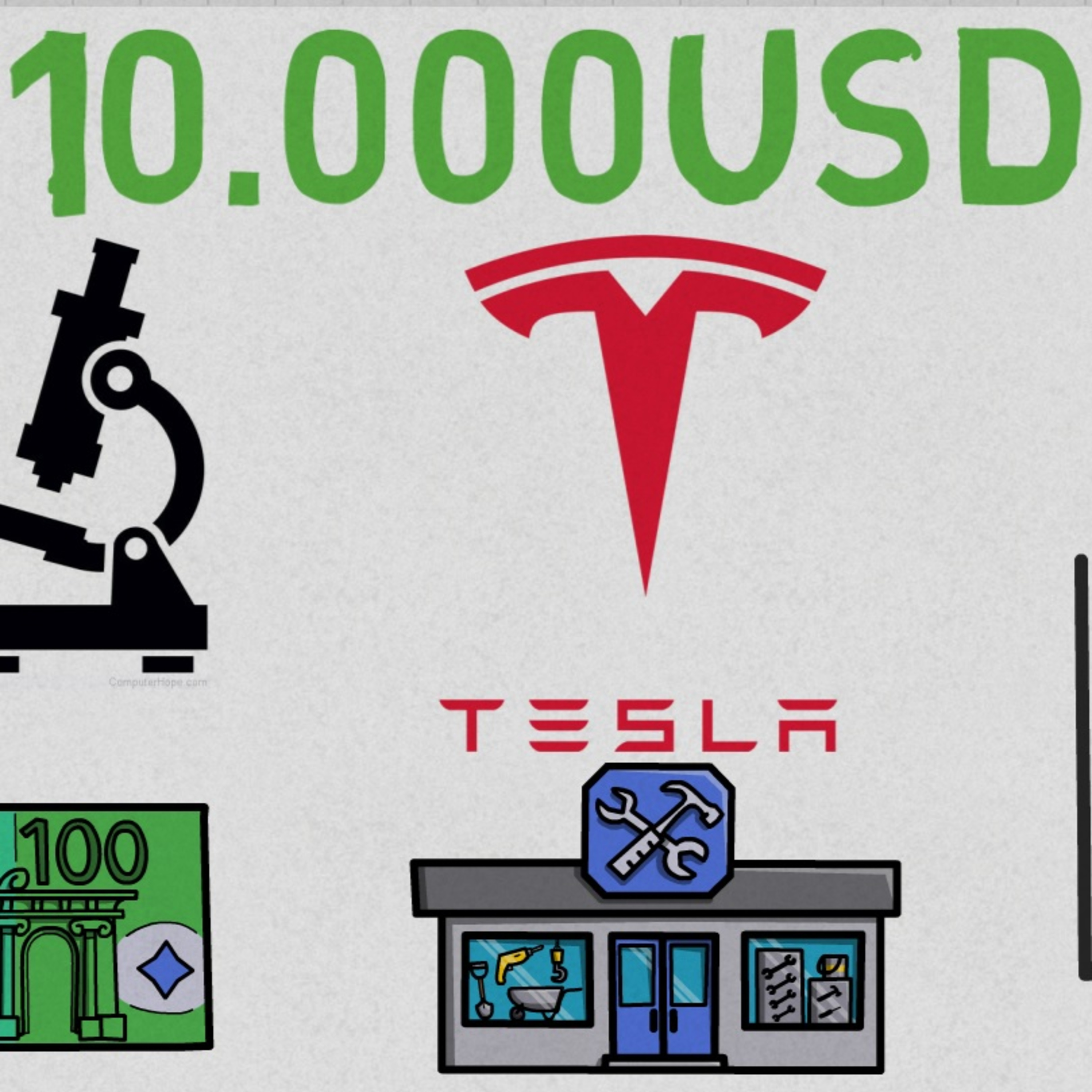
Berkay EkinciYATIRIMCI GÖZÜNDEN TESLA? 10X GERİ DÖNÜŞ MÜMKÜN MÜ? (PART 2) Bu gün TESLA Firması için 3 farklı senaryo oluşturup,firma önümüzdeki 10 sene içerisinde hangi değerlemelere ulaşabilir bunu bulmaya çalışacağız. Firmanın finansal kısımlarını inceleyip,firma kağıt üzerinde nasıl, gelirleri ne durumda,kendisini çevirebilecek noktaya geldi mi,yaptığı yatırımlar,üretim adeti gibi konulardan konuşup TESLA nasıl bir yatırım olabilir bunun üzerine düşüneceğiz. Öncelikle firmanın Bilançosunda temel olarak nelere dikkat etmeliyiz,çok basit olarak bunu size göstermek istiyorum. UNUTMAYIN Kİ: Benim burada gösterdiğimin üzerine ben oradaki her kalemi detaylı olarak inceliyorum.Firmanın...
2020-04-2611 min
The Smart and Sustainable City podcastUNECE (part2): Urban housing and developmentGulnara Roll works at the United Nations UNECE as the Secretary for the Intergovernmental committee on Urban housing, development and management. We discuss the impact of Covid-19 on cities and citizens as well the upcoming "forum of mayors" hosted by the UNECE next October 2020.
---
Send in a voice message: https://podcasters.spotify.com/pod/show/pierremirlesse/message
Support this podcast: https://podcasters.spotify.com/pod/show/pierremirlesse/support
2020-04-1316 min
The Smart and Sustainable City podcastUNECE (part1): View on Smart & Sustainable CitiesAnders Jönsson is the Chief of the innovative Policies Development section of the United Nations UNECE organization. Anders shares with us his expert view on effective Policy development practices for Smart & Sustainable Cities and reflects on those that create the biggest impact. We discuss his views & learnings, built on his engagement with key governments officials and cities stakeholders.
---
Send in a voice message: https://podcasters.spotify.com/pod/show/pierremirlesse/message
Support this podcast: https://podcasters.spotify.com/pod/show/pierremirlesse/support
2020-03-0311 min
Feminists Want System ChangeEP8_LGBTQI+ Human Rights_Rashima Kwatra from SwedenFor the last episode of Feminists Want System change at the UNECE Beijing25+ Platform for Action regional meeting, Anne-Sophie Garrigou speaks with LGBTQI+ activist Rashima Kwatra who works for the Swedish organisation RFSL about the structural barriers LGBTQI+ people face and international policy recommendations.
2019-10-2911 min
nowyouknow's podcastTesla Time News 164!Welcome back for episode 164 of Tesla Time News!!!! Stay tuned for Tesla Time News every Monday! Please consider supporting us on Patreon. We have some pledge rewards you may be interested in, so go check that out. Now You Know! #Tesla #NowYouKnow #ElonMusk Fully Charged Live promo code: NYK2019 https://fullycharged.show/events/fully-charged-live-north-america/ Want to buy Zac and Jesse's shirts and help support the show? Visit https://nowyouknow.ecowear.us/ to get your merch! Want more Tesla videos? Check out our friends' channels here: Like Tesla - http://www.youtube.c...
2019-10-2859 min
5 KİŞİ PODCASTHer Hata Bir Öğrenim Fırsatıİşler iyi gidiyorken hiçbir problem yok.Ama hem kendimiz hata yaptığımızda hem de değer verdiklerimiz hata yaptığında ne düşüneceğimizi, kendimizle, sevdiklerimizle nasıl iletişim kuracağımızı bilemiyoruz.Bu solo bölümde hata yapma, hatayı kabullenme ve en önemlisi kendimize kızmak yerine bu hataları öğrenime çevirebilme konularını konuştuk. Get full access to 5 MADDE Bülteni at erayerdogan.substack.com/subscribe
2019-09-2414 min
nowyouknow's podcastTesla Time News 143Welcome back for episode 143 of Tesla Time News!!!! Stay tuned for Tesla Time News every Monday! Please consider supporting us on Patreon. We have some pledge rewards you may be interested in, so go check that out. Now You Know! #Tesla #NowYouKnow #Tesla #SentryMode Want to buy Zac and Jesse's shirts and help support the show? Visit https://ecowear.us/ to get your merch! Want more Tesla videos? Check out our friends' channels here: Like Tesla - http://www.youtube.com/LikeTesla Hyperchange TV - https://www.youtube.com/hyperchangetv Sean Mitchell - h...
2019-06-031h 08
This is Where We LiveTIWWL: Dr Orna Rosenfeld on trends in European housing policyDr Orna Rosenfeld is an international housing expert and chatted with Helen Shaw about trends in housing policy for This is Where We Live during the recent Housing For All conference in Vienna, December 2018.
Dr. Orna Rosenfeld is a housing adviser to the European Commission, the United Nations Economic Commission for Europe (UNECE) and international development banks financing housing. She is adjunct professor at Sciences Po – Paris Institute of Political Sciences in Paris and and alumna of the University of Westminster in London.
www.thisiswherewelive.ie for more
2019-01-1712 min